2 Women + 1 Village = Hope
The Diagnosis: Walking Through a Child's Chronic Illness

Searching for Stillness
Through the Wringer
What's in a Name?
Vital Relationships in Military Ministry






2 Women + 1 Village = Hope
The Diagnosis: Walking Through a Child's Chronic Illness

What's in a Name?
Vital Relationships in Military Ministry





Weighing in at 75 pounds of fluff, ears, and belly rubs, Wrigley, our ten-year-old German Shepherd, has long since passed the puppy stage. These days she’s mellow, gentle, and prefers a sprawl in the sunshine over the hot pursuit of squirrels. Lately, I’ve affectionally taken to calling her “The Big Fluffy.”
In contrast, Honey is a 45-pound dynamo of short-haired, tail-wagging, tongue-lolling mutt energy. Two years old and full of mischief, she digs, climbs (trees, no less), jumps, rolls, and barks non-stop. Chasing rabbits or any other unfortunate small creature that happens into our privacy-fenced backyard is her priority in life — right after food, that is. More than once, while shaking my head in half amusement, half irritation, I have told my wife, “We should have named her WILD Honey.”


Honey joined our family after the passing of Ginger the Bassett Hound left Wrigley grieving and moping. But The Big Fluffy got more than she bargained for when Honey arrived. I will never forget the tiny, energetic puppy running in wild circles around her new playmate. From that moment forward, Wrigley’s grief was over. She simply had no time for it.
The puppy got into everything. She ate Wrigley’s bed. She stole Wrigley’s dog treats. She hid, buried, and devoured Wrigley’s toys, even the chewproof ones. She jumped back and forth over Wrigley during walks, hopelessly tangling both leashes. Honey followed Wrigley everywhere, stretching
her little legs to match Wrigley’s longer strides. Wrigley didn’t know what to think. Usually gentle, the new addition stretched the outer limits of her patience. Obviously, she needed space, some boundaries. First, she flattened her ears (never good). Then she growled; then she really growled. Finally, she nipped. You'd have thought the puppy was dying, the way she squalled.
“Finally,” I thought, after we made sure only Honey’s feelings had been hurt. “Maybe now, she will give Wrigley some space!”
Not a chance. Ten minutes later, the shenanigans began again. We wondered if we had made a mistake. Would Wrigley reject this new non-stop source of irritation?
The answer came in the most terrifying of ways during my wife’s evening walk. Three adult Bull Mastiffs tore loose from their owners and rushed Jennifer and our dogs. Despite being outnumbered, outweighed, and outmatched, The Big Fluffy planted herself firmly between the rushing Mastiffs and my wife, who was carrying Honey. Growling fiercely, she refused to back down. Thankfully, the owners arrived and dragged the Mastiffs away before serious injuries occured. Safely back behind their privacy fence, Wrigley sniffed the still-shaking Honey from head to toe, then licked the top of her head. I couldn’t help but smile. Honey had found a home.
These days, the two are inseparable. Honey’s energy has brought new life to her old friend. They play endless games of chase and keep away, and on chilly mornings, two heads pop out of one doghouse when I open the back door.
We could learn a lot from Wild Honey and The Big Fluffy. Sometimes, it’s tough when generations must learn to live and work together, even in the church. Making it work can result in some growling and grumbling…and sometimes feelings get “nipped.” But when push-comes-to-shove, we must remember we are all in this together.
About the Columnist: Eric K. Thomsen is managing editor of ONE Magazine. Email: eric@nafwb.org.

EDITOR-IN-CHIEF: Eddie Moody MANAGING EDITOR: Eric Thomsen
ASSOCIATE EDITORS: Ken Akers, David Brown, Jeff Caudill, Adra Chandler, Chris Compton, Danny Conn, Bethany Douglas, Ruth McDonald, Deborah St. Lawrence
LAYOUT & DESIGN: D6 Family Ministry DESIGN MANAGER: Andrea Young DESIGN: Marianne Stewart PRINTING: D6 Family Ministry
While ONE Magazine is provided to the reader free of charge, tax-deductible donations are both accepted and appreciated.
To make a donation, simply send check or money order to ONE Magazine, PO Box 5002, Antioch, TN 37011-5002.
PHOTO CREDIT: Eric Thomsen, Shutterstock.com, Istockphoto.com, Stockxpert.com, Designpics.com, Rodney Yerby.


Cindy lay face down on the concrete floor of a guest house in Gula, Uganda, weeping and crying out to God. “Lord, I don’t know what I can do, but whatever You want me to do, I’ll do it.”
The year was 2006, and Cindy Cunningham had spent several days among hundreds of desperate children in Northern Uganda — children of war, sex slavery, starvation, and mud huts. “Little kids ages two to 15 — like ghosts. I could see every bone in their bodies,” Cindy said. She had arrived in Gulu at night, no electricity, in a darkness so thick you could feel it. “Night in Uganda is unbelievably black,” she recalls.
Rose Aber, a Ugandan Christian, age 23 and in a full-term pregnancy, showed Cindy around Gulu. Rose was a trauma counselor with World Vision International. At night, she slept under a large former UNICEF tent with terrified children — their tent surrounded by a 10-foot-high fence with barbed wire and guards lining the perimeter with AK-47s.
Every night, children came to the tent from nearby villages because “God is there,” they said. A 14-year-old girl told Rose, “If I don’t come here, they will abduct me, and if they don’t abduct me, they will kill me.” Brokenhearted, Rose listened to the stories. Eight-year-old Joseph said, “They put a machete in my hand and said, ‘Kill that boy, or that boy will kill you.’” Another said he was ordered to kill his mother and father with a machete.
Rose cried out to God to help her endure and listened more. She understood fear and suffering. When Rose was young, she escaped capture by hiding among trees and bushes while her father was abducted.
Both boys and girls were kidnapped by the terrorist group the Lord’s Resistance Army that was led by Joseph Cony, a Ugandan who claimed to be God. Boys became soldiers; girls became sex slaves. Mostly at night, LRA came into small villages, burned, raped, and abducted children between ages six and 12, some younger, some older.
If they had shoes, the shoes were taken. The children’s hands were tied to their waists and to other children and marched away. They walked for days, drank their own urine, and in the first two weeks were often ordered to kill someone with a machete. No guns were given to the children until they were fully brainwashed into the LRA.
Hundreds of Internally Displaced People camps (IDPs) sprang up during those years of the worst of the LRA siege. IDPs sheltered mostly women and children displaced within their own country by the LRA. Men often fled. Some joined the LRA.


In 2007, one year after that first visit, Cindy founded Village of Hope Uganda. Rose resigned

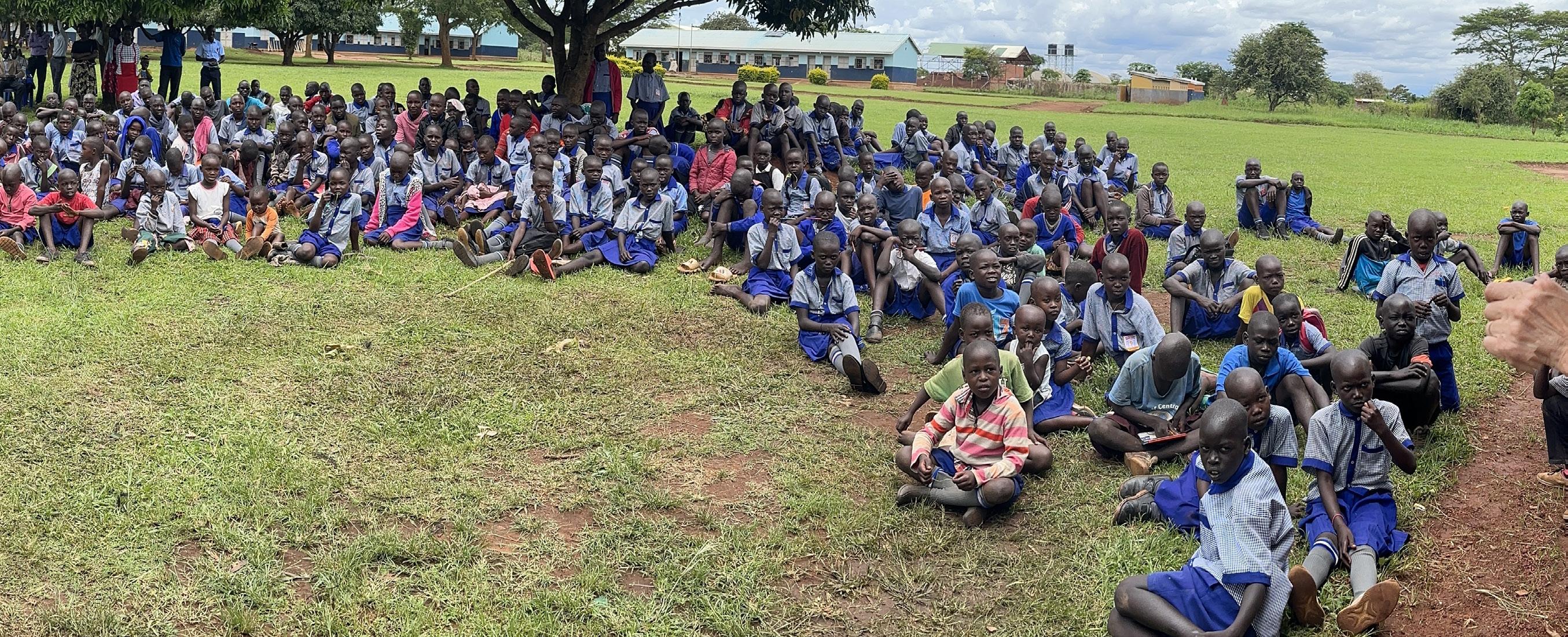
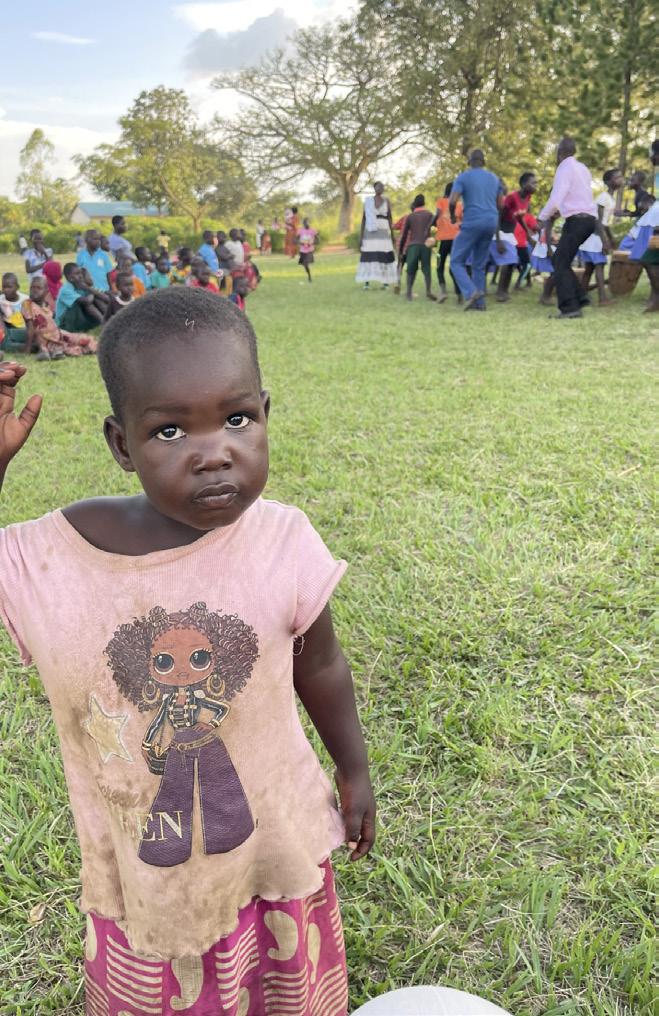
from World Vision and became the boots-on-theground national director of the village. Eighteen children lived in Rose’s home those first years. By 2010, they had built four homes for 96 children on a hundred acres of land.
Through prayer and obedience to the Lord, two women from 8,000 miles apart birthed Village of Hope Uganda among the Acholi culture surrounding Gulu. Their mission was, and still is, to rescue and nurture mistreated, orphaned, and terrorized children using six resources: safe homes, nutritious food, education, medical care, trauma counseling, and Christian discipleship. “We restore childhood to these children, knowing only Jesus can transform hearts so terribly mistreated.” Cindy says.

“We give hope, and hope changes everything.”
Today, Village of Hope Uganda has two campuses for about 800 day and residential students. Bobi Village serves elementary children on 50 acres, and Bweyale Village ministers to high school and trade and vocational school children on 180 acres. As children graduate from primary school at Bobi, they move on to Bweyale Village to pursue high school or vocational training.

“Children do not age out at Village of Hope,” Cindy says. They stay until they are healed physically and psychologically, have spiritual guidance, are educated, and are prepared vocationally to sustain themselves or move on to college. About 50 graduates are currently training in various fields in college. Several have returned
to the villages as staff members, including teachers and librarians.
Free Will Baptist Foundation Director David Brown reports a beautiful new library is a recent addition to Bobi Village, thanks to a Foundation grant in 2022. American churches collected and shipped 3,000 English-language children’s books to the library. (English and Swahili are the two official languages of Uganda, which was a British Protectorate until it gained independence in 1962.)
Brown, along with International Missions Director Clint Morgan and their team, visited Village of Hope Uganda last September. IM is a partner with Village of Hope.
Farming plots at both Bobi and Bweyale are designated for cultivation and animal husbandry to meet part of the food and firewood needs. Farms also offer agricultural training for students as well as a small revenue stream for the two villages. In addition to agriculture, the vocational school at Bweyale offers certification in construction, auto mechanics, tailoring, and hair dressing.
Tabitha Artisans in Gulu is the Village’s micro-economic program for women and girls who escaped from the LRA but became “child mothers” because of torture and rape. Often, they and their “rebel babies,” as the community calls them, were rejected by their families and communities. The Village provides trauma counseling and hope through business and skill training in sewing, jewelry-making, and basket weaving so these child mothers can provide for themselves and their children.
Though Village of Hope Uganda is thriving, much remains





to be done. Cindy notes, “Eighteen villages or camps are waiting to be helped,” and the need for financial sponsorship is great. “Rose and I ask for ‘joined hands’ to help us meet the needs of those villagers.”
Cindy first felt the call to Africa at her home church. She was 18, and medical missionary Dr. Laverne Miley spoke of his and his wife’s work in C Ôte d’Ivoire, West Africa. “I was called at 18, but I was 44 before I set foot in Africa the first time,” Cindy says. But those long intervening years prepared her to found Village of Hope Uganda and the work that has followed.
After graduation from Welch College, Cindy taught kindergarten in a Free Will Baptist missionary school in Hawaii and then led high school work with another church. Later, she did relational evangelism at Youth for Christ’s Campus Life Clubs. Still later, she worked with the Josh McDowell ministry for several years and finally was sent to Africa in 2006 by that ministry.
As for founding Village of Hope Uganda, Cindy says, “Those long years and all that other work were ‘stepping stones’ that prepared me. I love people, and connecting people with Jesus was the most important thing I did, but I never felt I was a number one leader. At Youth for Christ and Josh McDowell’s organization, I was a ‘second’ person. I did logistical assistance, so to speak, taught, organized events, and other ministry work. During one short period I even worked in my brother’s accounting firm in Arkansas, learning to keep books, do budgets, and financial things. I didn’t know I’d later need those skills. But God prepared me.”
“When I founded Village of Hope, I still didn’t know what I was doing. My brother filled out the 501(c)(3) paperwork. Others came along to do a website or pay for this or that. I asked friends and acquaintances to advise or be board members. I now look back and say I jumped out of an airplane, but Someone gave me a parachute.”
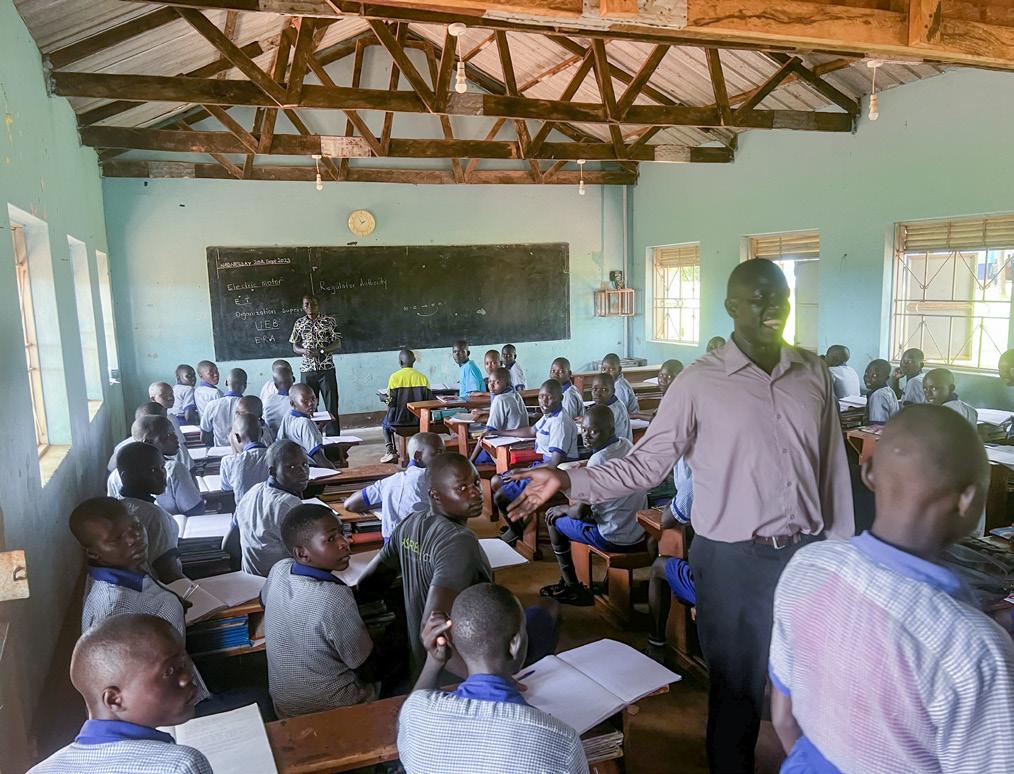
“Like I said, God prepares you! Nothing is wasted.” Not even trauma or pain, and Cindy’s had plenty of that — seizures, a brain tumor the size of a tennis ball, no insurance, a second tumor, and meningitis that almost took her life. “Even stupid little jobs. God uses everything to prepare us for something else. He does far more, abundantly more, than we hope or ask or think. Ephesians 3:20 is my life verse.”
Cindy and Rose…2 women + 1 village = hope.
About the Writer: Bill and Brenda Evans live and write in Ashland, Kentucky. Their email is beejayevans@windstream.net.
Want to learn more? Make time at the 2024 NAFWB Convention to attend Village of Hope's seminars sponsored by the Free Will Baptist Foundation: “Child of War to Child of God” and “Joy in the Midst of Pain.”

Explore proven strategies to engage al l generations.


During six years of teaching English to refugees and immigrants in my hometown, I’ve noticed a pattern. My students are comfortable practicing English in the classroom, but they lack confidence to use their new language in everyday life. One day, it occurred to me language learners don’t need more worksheets or homework. They need English-speaking friends!
What a wonderful opportunity for us as believers to befriend the nations. We are equipped with the loving words of Christ on our tongues and His gentle Spirit in our hearts, and it is our responsibility to steward those gifts well.
You can find English language learners through other churches, nonprofits, or libraries in your area. These agencies can connect you to structured, regular meetings with students of the language.
If you do not have the capacity for a volunteer commitment right now, look for neighbors in your everyday
routines. As you wait in line at the grocery store or peruse the same rack of clothing at the store, watch for every opportunity to engage and encourage someone.
Explore the diverse pockets of your town. Try new restaurants or visit local markets. As you step into these places, organic opportunities to learn your neighbors’ stories and experience their cultures will enrich your understanding of the nations.
In every encounter, honor the image of God by showing compassion when listening to difficult refugee and immigrant stories. Your neighbor’s English might be broken, so have patience to speak slowly and listen carefully. Be encouraging. Compliment often. Use words that fit their learning level. Your
Your words will make an impact, but greater than that, the light of Christ within you will shine brightly and share hope.
words will make an impact, but greater than that, the light of Christ within you will shine brightly and share hope.
Many folks assume they must be bilingual to communicate with refugee and immigrant neighbors. Although the language barrier is real, the Holy Spirit does not need an interpreter to communicate kindness. He can make much of a few, short words. As you step out in faith to befriend the nations, you demonstrate to the watching world that diversity is central to the Christian faith. Your children will watch you too. By your example, they will
Enjoy your cake... and eat it, too!
Planned giving not only benefits the Free Will Baptist ministries of your choice long after you have gone to your eternal award, but it also has many benefits in the here and now! Starting with as little as $5,000, enjoy fixed income for life, with interest up to 9.25%.
Receive tax-free income in some cases and avoid capital gains in other cases. So enjoy your "cake" and make a difference for ministry at the same time.
see we are called to live missionally, no matter where we are located on the map.
God has been faithful to bring the nations to us. Let us be faithful to meet them here.
About the Writer: Brianna Persinger, a 2017 Welch College graduate, interacts with more than a dozen cultures every day as she coordinates a literacy program for refugee youth at a small nonprofit in Nashville, Tennessee. To find non-English-speaking neighbors near your church, email questions@nafwb.org to get a B.L.E.S.S. profile.

It’s tough to be a girl in today’s culture. Society puts heavy pressure on girls to be obsessed with aesthetics, image, and labels through celebrity culture, commercial advertisements, and the plethora of social media, apps, AI, and other technologies. The chaos and confusion make it all too easy for them to look to outside sources (influencers from Insta, Tik-Tok, and Reddit; friends; romantic relationships; academics; sports; and more) to find acceptance and self-worth or to form an identity.
Unfortunately, these cultural guides are like “shifting sand.” When life inevitably changes (sports injury, a move, a break-up, bad grades), for girls whose sense of worth is not anchored in Christ, the changes often become the source of an identity crisis, generating anxiety, isolation, or depression.
Instead, girls should be encouraged to remember who they are depends on whose they are. And they are God’s girls. Identity isn’t truthfully derived from other people’s opinions or cultural sources. We can’t even assign ourselves true value and worth. Only our Creator has the right to define us. He created us in His image, and when we fell into sin, He did everything necessary to make us worthy, to restore our relationship with Him through the death and resurrection of Jesus. He calls His girls to shine His light and expose lies with His truth. That’s what Shine! conferences are all about.
Shine! Is Life-changing.
Shine! has been incredibly impactful for the young ladies and women in the Central Midwest area. Cross Point Free Will Baptist Church had the amazing opportunity to host the conference in 2023. The one-day event helped women (of all ages) find their place and purpose as they prepared for an event that would be life-changing for teens who attended. This event was multi-church, multigenerational, and multi-denominational, which was incredible for our younger generation to see. We are truly better when we work together!
Throughout the conference, young ladies had an opportunity to worship, hear biblical teaching, and enjoy hanging out with friends and leaders. Many heard teaching that helped them understand their value and worth for the first time, resulting in salvation decisions and spiritual growth. Speakers spoke with boldness and transparency as they declared God’s Word, Christ’s love, and His forgiveness. When the 2024 dates were announced, our young ladies were eager to attend and came to this year’s event expecting God to move in their lives.
I am very thankful for Shine! and the impact the conference is making in the lives of young ladies. Additionally, Shine! helped energize women within our churches to invest in and equip our young women for Christ. Shine! is certainly a “better together” and “everyone everywhere” event.
— Deirdre Vickers, Wichita, KS
Shine! Is Exciting.
In March 2023, the ladies at Cultivate Free Will Baptist Church were privileged to host a Shine! event. The event was well attended, with more than a hundred teen girls, along with moms, pastors’ wives, and youth workers. The
Our worth was never meant to be assigned by others, nor were we meant to find it within.
Our inexpressible value comes from being made in the image of our Creator, and what makes us worthy is His “enoughness” in our place, through His death on the cross and glorious resurrection.
excitement in the building built quickly as the girls were greeted at the door with gift bags, a coffee bar, a hair tinsel station, and photo booth opportunities.
When the services began with Cultivate’s worship team leading the girls in songs of praise to the Lord, the excitement grew even more! It was such a joy to hear so many teenage girls lift their voices in worship. The speakers for the day shared their testimonies and Scripture, exactly what the young ladies in attendance needed to hear.
Hosting a Shine! event was such a blessing for me as a pastor’s wife. Cultivate is a church plant, and this was the first time most of our ladies had been part of any event like this. It was a joy for us to plan, decorate, prepare food, assemble gift bags, practice music, and prepare to speak.
On the day of the event, I stood with tears in my eyes as I watched my precious friends serve the younger generation. We ended that day praising God for what He had done and asking when we could do it again!
— Melanie Franks, Athens, AL
Shine! Is a Journey in Obedience.
I am grateful to God for the doors He has opened as I’ve stepped forward in obedience. I appreciate WNAC allowing me to host the 2024 Shine! conference at Randall University. Reflecting on this conference, I am reminded of God’s guidance, particularly in my commitment to teaching and encouraging young women (Titus 2:3).
Driven by a heartfelt desire to bridge the generational gap in our Free Will Baptist churches, we first engaged mature women by organizing prayer groups in each church. Additionally, due to the generosity of many churches, we were able to give away more than a hundred baskets filled with tangible expressions of love and support for the young attendees. These baskets included testimonial letters, encouraging these young women to embrace biblical womanhood.
The conference theme, “Are You Brave Enough to Be a Biblical Woman?” was carefully chosen to address the secular worldview that pressures our girls today. Through biblical teachings and examples of courageous, biblical women, attendees were inspired to glorify God, follow the Lord Jesus faithfully, proclaim His gospel, and trust Him as provider and protector. Drawing from Deuteronomy 31:6, “Be strong and of a good courage, fear not, nor be afraid of them: for the Lord thy God, he it is that doth go with thee,” we found assurance that God equips us to embody biblical womanhood.
Hosting this conference was a journey of obedience. God’s kindness was evident in the attendance of over 500, the representation of 66 churches, and the financial help from churches in the Oklahoma City area to host the event at Randall University. I am certain the Holy Spirit was present. I cling to the promise in Isaiah 55:11, “So shall my word be that goeth forth out of my mouth: it shall not return unto me void.”
Without reservation, I can sing, “Behold our God, He is seated on His throne!”
— Carol Thompson, Moore, Oklahoma
You’re Not Enough, but God Is!
“You are enough.”
This platitude is plastered on fancy stainless-steel cups, painted on beautiful wall art, and posted on social media a million times a day. It’s meant to console and comfort those who draw identity and worth from achievement or the approval of others. Like every other false gospel, it’s a works-based system. At first, it sounds like freedom —
there’s no need for transformation — just resting in our “awesome” selves and being “enough,” right?
Before long, however, we face the reality of our own brokenness. “Being enough” becomes an impossibly heavy burden in a never-ending cycle — a hamster wheel of good works and self-betterment that leaves us teetering on the edge of exhaustion and disillusionment.
Sweet sisters, the effects of sin and the fall were too far-reaching for any of us ever to be enough. This lie must be exposed and rejected. Our worth was never meant to be assigned by others, nor were we meant to find it within. Our inexpressible value comes from being made in the image of our Creator, and what makes us worthy is His “enough-ness” in our place, through His death on the cross and glorious resurrection. When our faith is placed in Christ, His perfection and righteousness are counted as our own — no more striving in self and slavery to sin. He adopts us as His own, daughters made worthy at a high cost, equipped to shine His light in the darkness.
— Beth Bryant, Olive Branch, Mississippi


January 5, 2018, is a day forever burned into my memory, a day that changed my daughter’s — and our entire family’s — way of life forever. At only ten years old, my youngest daughter, Emily Joy, had been battling frightening symptoms. Finally, we had an answer: Type 1 Diabetes (T1D).
What now? Where do we go from here? How will this affect her? These were among the many questions I asked the doctor, as I struggled with feelings of guilt, despair, and fear welling up inside. I had done some research on T1D, but I was not at all prepared for this.
The next few weeks brought much training and education. We learned T1D is an autoimmune disease Emily had from birth, and a virus set the disease in motion. As a result, her body no longer produced enough insulin. Emily would have to monitor her blood sugar constantly and receive multiple insulin injections daily for the rest of her life.
The crisis also reminded us of the strength we had observed in Emily over the years. Emily arrived six weeks early and required a week-long stay in a neo-natal intensive care unit for help with breathing and eating. She spent
another two weeks in the hospital before coming home on oxygen, which was required for months. She had already suffered through minor surgeries and been diagnosed with other issues. We had watched her fight for a decade, and we knew she was a strong girl. However, watching her give herself a shot of insulin for the first time was something altogether different. But she took charge of her illness, and she became my hero.
As a mom, it has been extremely difficult to watch my baby face the constant challenges of a chronic illness. And yes, I still encounter moments of guilt, despair, fear, and caregiver fatigue. Through those challenging moments, I have been encouraged by the words of Psalm 139:14: “I will praise thee; for I am fearfully and wonderfully made: Marvellous are thy works; And that my soul knoweth right well.” I have used this verse many times when talking with Emily about her differences, reminding her God created her exactly the way He did for a purpose. He equipped her to live this life.
One day, in a moment of T1D helplessness, God quietly reminded me that not only did He create Emily uniquely and purposefully, but He also created me uniquely and purposefully to be her mom and to walk with her through this illness. He knew all these things were going to happen to Emily before He created me and formed me.
Even more personal, He is the reason I have always been so inquisitive (sorry, Mom and Dad), have always had a stubborn streak (again, sorry, Mom and Dad), and have always had the desire to find answers to tough questions. He knew I would need those characteristics to research, educate, and advocate for Emily and others with T1D.
It is incredibly comforting to know the God who created us did so with care, planning, and love. He wants to help guide us through all the things of life. This may not be a divine revelation to you, but in that moment, it hit me like a bolt of lightning. God cares so deeply for us He takes time to remind us constantly of promises He has made and kept!
Pain, fear, fatigue, and frustration will always be a part of this journey. I will always encourage Emily to talk about those feelings, cry with her, pray with her for strength to get through difficult moments, and lean into Jesus for comfort on the hardest of days. But we will also continue to celebrate good days and remember God has not failed us, and He never will. We can witness with the prophet Jeremiah that the steadfast love of the Lord never ceases; His mercies never come to an end; they are new every morning, and His faithfulness is great (Lamentations 3:22-23).
About the Writer: Sarah Lawson and her pastor husband Jimmy have two beautiful teenage daughters: Olivia and Emily. Sarah enjoys being able to help others with life, especially teaching people how to use technology while helping them remember they have much to offer the Kingdom of God.





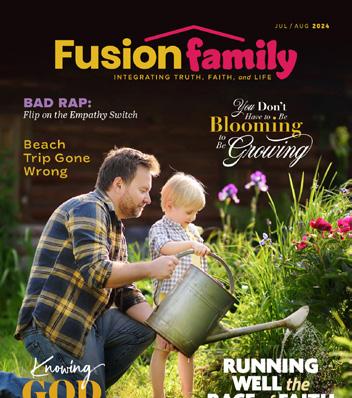

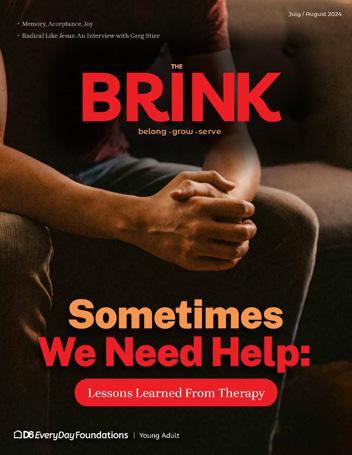
“Henceforth I call you not servants; for the servant knoweth not what his lord doeth: but I have called you friends” (John 15:15).
The day-to-day rhythms of home life change the world. It has always been so.
Harriet joined five siblings when born into a preacher’s family in 1811. A Christian atmosphere permeated the household. Her mother Roxanna poured herself into her little lambs. An “enthusiastic horticulturist,” she once received some flower bulbs as a gift. Harriet, age four, discovered them and somehow thought they were onions, “such as grown people ate and would be very nice for us.” Persuading her brothers, she sat down with them to a meal of tulip bulbs. The “odd sweetish taste” disappointed them, as did the correcting words of their mother: “My dear children, what you have done makes mamma very sorry. Those were not onions but roots of beautiful flowers, and if you had let them alone, we should have next summer in the garden great beautiful red and yellow flowers such as you never saw.”
Tuberculosis struck Roxanna, and Harriet was allowed to visit her mother once a day. She remembered seeing “the bright red spot on each cheek and her quiet smile.” Roxanna died September 23, 1816, at age 41, leaving seven children. As little ones do, they asked where their mother was. Someone replied, she “had been laid in the ground,” and another said she ”had gone to Heaven.” Three-year-old Henry heard these responses and put them together. One morning, they discovered him digging in the yard. When asked what he was doing, he answered: “Why, I’m going to Heaven to find mamma.” Little Henry would grow up to be perhaps the best-known preacher of his generation in America. Five of his brothers would also enter ministry.
After Roxanna’s death, Harriet’s aunt, a natural teacher, took her in. She soon could read well. Memory work included a catechism and plenty of hymns, poems, and Bible verses. She also discovered Arabian Nights and dreamed of magic carpet rides.
Her father soon remarried, and Harriet settled back into home life. Around age ten, a teacher encouraged her
to write, and within two years she penned the standout essay “Can the Immortality of the Soul Be Proved by the Light of Nature?” But for all her intellectual gifts, much of what was said at church remained a mystery to Harriet. She wrote: “Most of father’s sermons were as unintelligible to me as if he had spoken in Choctaw.”
But when she was 14, one of her dad’s simpler messages struck home. He focused on Jesus’ desire to have not just servants but friends. Harriet recalled: “He spoke in direct, simple, and tender language of the great love of Christ and His care for the soul. He pictured Him as patient with our errors, compassionate with our weaknesses, and sympathetic for our sorrows….I sat intent and absorbed. Oh! how much I needed just such a friend, I thought to myself.”
During that sermon, Harriet trusted Jesus. As she walked home from church that day, she said, “It seemed to me as if nature herself were hushing her breath to hear the music of Heaven.”
When her dad arrived home, she fell into his arms and said, “Father, I have given myself to Jesus, and He has taken me.” I never shall forget the expression of his face as he looked down into my earnest, childish eyes….‘Is it so?’ he said, holding me silently to his heart, and I felt the hot tears fall on my head. ‘Then has a new flower blossomed in the Kingdom this day.’”
Harriet grew up to marry a minister herself. She gave birth to seven children in 14 years, and the family scraped by until 1852 when she published Uncle Tom’s Cabin. In a matter of months, her family became rich, and she was numbered among the most famous women in the world.
About the Columnist: Paul V. Harrison has pastored Madison FWB Church in Madison, Alabama, since 2015. Previously, he pastored Cross Timbers FWB Church in Nashville, Tennessee, for 22 years. He was an adjunct professor at Welch College for 17 years, teaching church history and Greek. Paul is the creator of Classic Sermon Index, a subscription-based online index of over 66,000 sermons, with clients including Harvard, Baylor, and Vanderbilt, among others: classicsermonindex.com.
In October 2013, 87 migrants from the country of Niger were on their way to Algeria when their truck broke down. They found themselves in the middle of the desert, far from civilization. Soon they ran out of water. Most died from dehydration. Only a few survived. When David wrote Psalm 63, he was in the wilderness of Judah, pursued by his enemies, facing the scorching heat of the day, the cold at night, and thirst from a lack of water. And this psalm is what he wrote to help deal with the pressure, difficulty, and spiritual dryness.
While it is unlikely any of us will find ourselves in a physical desert without water, we will surely — at some point in our lives — go through times of spiritual or emotional desert. When we find ourselves in situations like this, what will we do? David’s response from the wilderness can help our own response when we find ourselves in a spiritually “dry and weary land.”
David declared Elohim was his God. Despite being surrounded by polytheistic nations, David rejected that belief and proclaimed his allegiance to the one true God. This also signifies David knew God in an intimate, personal way. There is a difference between knowing about someone and truly knowing that person. Many people know about God but don’t really know Him. David desired to seek after God and know Him intimately.

Do we seek the Lord with longing? Do we look forward to coming into God’s presence to spend time with Him and get to know Him better? It’s easy to fill our lives with things other than God. Relationships. Ministry. Possessions. Careers. All these can be good, and they have their place, but they are not meant to satisfy our souls. God alone can do that.
If you were thirsty, it would be unthinkable not to drink water to satisfy your thirst. It should be the same in your spiritual life. When you’re going through a spiritual desert, you need to cling more and more to God and His Word.
In this psalm, we find David longing to worship the Lord in the sanctuary in Jerusalem. But he couldn’t, because he was in the wilderness of Judah fleeing those seeking to kill him. Yet he remembered God’s power, glory, and steadfast love, and those remembrances sustained him through this difficult time.
When the biblical authors pondered the person of God, they consistently described His character as compassionate and gracious, slow to anger, overflowing with steadfast love and faithfulness. In verse three, the word David used to describe God is hesed, translated lovingkindness or steadfast love. The core idea of this term communicates loyalty or faithfulness within a relationship. Thus, hesed is closely related to God’s covenant with His people. As to the concept of lovingkindness, hesed expresses God’s faithfulness to His people, as well as His mercy, even though they don’t
deserve it. These thoughts of God were able to sustain David in the wilderness and gave him hope for the future.
When we see the power and glory of God, when we experience the great love and mercy of the Lord, and when He satisfies the thirst we have, our response should always be one of delight and praise. David wrote this psalm in the wilderness while pursued by enemies who wanted to kill him. He could have asked for help, but instead, he praised God’s faithfulness and steadfast love.

When we find ourselves in spiritual or emotional deserts, what will we do?
Have you had nights when you couldn’t sleep, thinking about or worrying about things? David had many such worries. He was driven from his home and his enemies were pursuing him, but in this psalm, we see him meditating on God’s greatness, mercy, and faithfulness. That was what David chose to think about. The process of memory recall can bring to the present both good and bad experiences of life, but the psalmist wanted to focus on the good. Satan, however, wants us to meditate on wilderness thoughts. He wants us to think we are alone. Many times, during the night when we have nothing else to occupy our minds, we think negative things.
During these times, more than ever, we should focus on God and His goodness and the fact He is with us and will neither leave us nor forsake us. Like David, we should meditate specifically on God being our satisfaction, our joy, our help, and our Protector.
What’s absent from this psalm is any attention to David’s earthly needs or distress. It seems his longing for and pursuit of God reflects a deep expression of trust.
David expressed his confidence God would save him from all his enemies. Do we always trust the Lord will do what’s best?
David did two important things here. First, he trusted God to exercise justice as it related to his enemies. David gave God the problem (his enemies) and trusted God to solve the problem. Second, he rejoiced in God’s deliverance. He had faith God would deliver him from his enemies.
Consider these takeaways from this psalm:
Thirst for God and Him alone. Don’t be satisfied with anything else.
Make time to spend with God. Schedule it and don’t skip it. You can’t know God intimately if you don’t make time to spend with Him.
Rejoice. When we’re in the desert, our first instinct is to complain, to be ungrateful, and to blame God or others. David rejoiced in the Lord despite his circumstances. He could do this because he remembered the Lord and meditated on Him and His previous blessings. The Lord is always faithful to us and can be trusted to get us through our difficult circumstances. So, rejoice in the Lord always, even during those desert times. When you focus on God, it’s hard to complain and be negative.
Meditate on God. When negative thoughts invade your mind, when the devil tries to raise doubts about your faith, and when anxiety and depression try to creep in, think about, meditate on, and sing about the steadfast love and goodness of God, recognizing He is the only One who can truly satisfy your thirst.
About the Writer: Tim Johnson and his wife Kristi served as Free Will Baptist missionaries to Spain for three decades. Currently, he serves as program coordinator for intercultural studies at Welch College. Learn more: welch.edu.

The sun began its slow descent below the edge of the field. From our cover in a ditch, the tufts of plants around us began to take on an orange-hued glow. Aside from the occasional squirrel’s chatter or breeze through the winter wheat, the whole earth seemed still. My eyes scanned the tree line in front of us for movement, but the only sign of life was the quiet breathing of my husband beside me. Although the point of our excursion was to add some venison to our freezer, I was not disappointed by the lack of deer. I inhaled more deeply than I had in some time, relishing the quiet beauty around us. Glancing over to my fellow hunter, I whispered, “This is the quietest my life has been since the baby was born. I don’t know the last time I was able to be this still.”
Stillness is increasingly difficult to find in our modern culture. We always face another task to accomplish, conversation to carry on, or notification to check. Even when we find those rare pockets of peace within our hectic days, we still must focus on calming the frantic pace of our own minds or settling the anxieties or emotions within us. The idea of inner stillness or a peaceful, quiet life sounds pleasant but idealistic, lovely but unattainable. Is this another item for our ever-expanding to-do lists? Should we pencil “search for stillness” into our planners?
No, but if we want to find a life that exemplifies this sort of peaceful living, we need to take a careful look at how we structure our days.
Life today is often busy, cluttered, and noisy. Our society is filled with modern comforts and conveniences. Yet we still find ourselves hard-pressed to find time for even a fraction of the still and quiet moments enjoyed by our ancestors who made do without dishwashers, washing machines, or even indoor plumbing. Should we not, with all our modern gadgets, be able to rest in ways about which previous generations only dreamed? In her recent book Old Fashioned on Purpose, Jill Winger explains, “As progress was solving many of our long-held problems, it was simultaneously creating a host of new ones. It would seem the easier our lives have gotten, the unhappier we’ve become.”
How can this be?
Several factors are at play. First, we have been convinced we need more things to feel satisfied. Consumerism has led many to believe happiness is found in more, not less. With the acquisition of things comes greater spending and longer working hours. The rise of social media has added another layer of complexity. It is no longer enough to have the nicest things; we must show others we live the nicest life. We may be tempted to exchange a quiet, simple life for a faster-paced, activity-filled one that looks better on paper, or at least on Instagram. As a result, we often forfeit opportunities for stillness when they arise, even in a busy life, thinking we should be doing something more productive or checking in on what others are doing.
This tendency leads to the second barrier to stillness in our modern world. We have become far too easily distracted. Some distraction may be due to human limitations, but much of our distractibility today is enhanced by an
information overload. Recognizing this tendency toward distraction, companies create technologies and products that capitalize on this weakness. In the process, they knowingly intensify the problem. Our focus and attention have become currency, and some apps can quickly bankrupt us.
Moments of stillness are hard to find because, in our noisy, distraction-filled world, it is much easier to scroll through email or social media, sing along to a curated playlist, or binge-watch the latest trending Netflix special than to sit in silence. Why? Because stillness is boring, and if there is one thing we have forgotten how to tolerate, it is boredom.
So, we push on, cramming our schedules with work tasks and extracurricular activities, and filling any free time left with scrolling and screen time. As a result, we become anxious, unfocused individuals who find stillness hard to obtain and, when given opportunities to practice it, even more difficult to enjoy.
With all these barriers to stillness, it might be easy to question the need for consistent moments of quiet in the first place. Is it important to seek stillness, if it means a slower-paced, simpler life? In a word, yes. While stillness itself may not be a fruit of the Spirit per se, it is an implication of the development of several fruits listed in Galatians 5. Let’s look at some of them and consider how seeking stillness in our lives can be an indicator of and a proving ground for these spiritual virtues.
Stillness indicates a strong faith in God’s sovereign power.
An unwillingness to take time for stillness is often an indication of a weak or underdeveloped faith in God and His sovereignty. We may say we believe God is omnipotent and holds all things together. However, our lives tell another story, one in which we play both author and protagonist. We may wear so many hats because we have come to believe we are the only ones capable of wearing them. Yet if we are willing to reduce our daily load and practice seeking simplicity and stillness in our lives, we display a faith in God’s power to sustain us and all the various endeavors we pursue. We show our passive obedience in recognizing our finite, imperfect nature in comparison to His ability to do all things well. In a daily practice of being still, we also actively obey His commands to spend time in His presence, learning of Him and His better ways.
Stillness enables us to practice peaceful living even in busier seasons.
We may not always be in a season of life that allows for an hour of quiet, peaceful time with the Lord or His creation. As the mom of two toddlers, I struggled to squeeze in time to write this article during nap times and before early morning cries interrupt my workflow. During these difficult, stressful times, the practice of stillness is most beneficial. By reducing the opportunities for distraction, embracing boredom, and practicing a simpler lifestyle, we begin to develop rhythms of life that allow for the work of the Spirit to continue producing peaceful fruit in us. This inner stillness is accessible despite chaotic seasons. Stillness gives us the space needed to live out the fruits of the Spirit in our relationships.
Human beings were not created for constant motion. We do not hold up well under constant strain. Stillness allows us to decompress from daily stress and reset our minds and bodies to function well for future obligations and endeavors. Without these consistent breaks, we eventually become less-than-ideal versions of ourselves. We find it much more difficult to walk in the Spirit under such conditions. This problem is particularly noticeable in our interactions; if we are not resting well, or if we are mov-
ing through life too quickly, we will find it increasingly difficult to be gentle, kind, and loving to our peers and family members. Setting boundaries in our lives enables us to ensure we spend necessary time at rest.
Stillness matters. But it is not something we will happen upon, especially if we follow the world’s template for life and success. We must say no to things — sometimes good things — to create the margin needed to embrace a life that is still and peaceful. We also must recognize stillness itself will not cure all our anxieties or frustrations. Peace is fully possible only through the Prince of Peace. We can worship Him through acceptance of His boundaries, quiet obedience in the spiritual disciplines, and time taken to experience awe at His handiwork. This sort of stillness does more than provide us with a quiet moment for rest. It sanctifies us. It restores our souls. “Come unto me, all ye that labour and are heavy laden, and I will give you rest” (Matthew 11:28).
About the Writer: Emily Vickery lives in Pleasant View, Tennessee, with her pastor husband Zach and children Jack and Daisy. She has a B.S. in Psychology from Welch College and an M.A. in Clinical Mental Health Counseling from the University of the Cumberlands. She works part-time at Welch College in the Institutional Research Office. Learn more: www.welch.edu.

Welch College recently announced it was among the top ten teacher education programs in the state of Tennessee exceeding expectations on the annual Educator Preparation Report Card. The report card evaluated teacher preparation programs at 42 Tennessee institutions.
Other colleges and universities meeting this designation include Carson-Newman University, Lipscomb University, Trevecca Nazarene University, Union University, the University of Memphis, and the University of Tennessee at Knoxville.
Dr. Stephen Beck, undergraduate dean of teacher education, said, “We are very proud of our students. Clearly, they are extremely well prepared for classroom teaching. This reflects well not only on our students but also on their very capable faculty and our excellent program. The college faculty have done a superb job preparing them for their careers. We commend them all.”
The Welch College teacher education program (operating since 1976) includes teaching licensure programs in mathematics, special education, English as a second language, biology, English, history, music, physical education,

elementary education, and instructional leadership. Hundreds of Welch graduates teach — not only in Tennessee but also across the nation and around the world.
For more information on degrees in teacher education at Welch, contact Dr. Stephen Beck at sbeck@welch.edu. Learn more about Welch College: www.welch.edu.
Welch College faculty, staff, and students, along with alumni and guests were exposed to tremendous preaching and teaching during Forum24, March 3-5, 2024. Speakers at the conference included Dr. Bruce Chesser, senior pastor of First Baptist Church in Hendersonville, Tennessee; Ed Goode, church planter at The Bridge Church in Champaign, Illinois; Tim Johnson, program coordinator for Intercultural Studies at Welch College; Ruth McDonald, director of WNAC; and Bobby “Butch” Taylor, pastor of Deep Branch FWB Church in Midville, Georgia.
Attendees were challenged to fill their hunger and thirst for God with Him and His Word alone. They were
reminded to serve the Lord with humility where He has placed them, even if no one notices.

Those in attendance were encouraged to build on the firm foundation of Jesus Christ and to continue to hold fast to the Word of God, no matter how the world around them may try to change or ignore it. The conference concluded with a charge to demonstrate the marks of true disciples of Jesus.
Forum25 is scheduled for March 9-11, 2025.
1 THESSALONIANS 5:23-24
Sometimes the best theology is found in children’s songs.
For instance, the song “He’s Still Workin’ on Me” has a verse that says:
There really ought to be a sign upon my heart: Don’t judge him yet, there’s an unfinished part. But I’ll be better just according to His plan
Fashioned by the Master’s loving hands.
We find two important truths in those simple words: we are works in progress, and God is going to see that work through to the finish. Our Christian lives are all under construction. This side of eternity, change and growth will always be part of our experience. You will never be able to say, as a Christian, you have arrived at a place in your life without room to grow.
In 1 Thessalonians 5:23, we find Paul’s prayer for these young Christians, a prayer to be answered when Jesus Christ returns.
Two phrases in verse 23 appear to overlap. The phrases are “sanctify you wholly” and “be preserved blameless” followed by a time-stamp — when Jesus Christ returns.
While a big word, sanctification simply means to make holy, to set apart, or to be set apart as belonging to God. In the Old Testament, something sanctified was no longer common but held a unique purpose for the Lord.
Consider two types of sanctification: positional sanctification and practical sanctification. With positional sanctification, Jesus Christ is our sanctification and redemption. In Him we are blameless. It is through our union with Him, the only blameless One who achieved our redemption, that we are set apart as belonging to God. Through Christ we are acceptable to God, and through Christ we are seen as blameless in God’s sight. We are sanctified (made holy and declared holy) and blameless (declared blameless in His sight).
Because we have positional sanctification, we are called
to live out that sanctification in our daily lives. This is practical sanctification. We must strive constantly to see God’s grace and power transform every aspect of our lives. Understand, entire or complete sanctification will not be realized in this life. Rather, perfect sanctification or holiness comes only when we enter Heaven. Some denominations teach the possibility of entire sanctification in this life, that through effort and faith a person may reach perfection. However, Scripture never teaches we can be fully free from sin in this life, even as believers.
Progressive sanctification is the ongoing work of the grace of God in our lives by which we are gradually conformed into the image or likeness of Jesus. We have a role to play in progressive sanctification — our obedience and effort. At times, we can become discouraged at our lack of progress. Paul’s wonderful prayer in this verse reminds us of our eschatological hope, our final sanctification in the presence of Jesus.
Paul's prayer (or blessing) makes it clear sanctification touches the entire person. Paul prayed for God to sanctify the believers entirely, that salvation would impact the whole person, not a few parts, but every part of what makes you the person you are — mind, heart, and will.
This is further demonstrated by the next phrase: “I pray God your whole spirit and soul and body be preserved blameless unto the coming of our Lord Jesus Christ.” Again, Paul emphasized the entire person. Being human includes both an immaterial part we cannot see (spirit and soul) and a material part (body). But the immaterial and the material coexist.
We have an active role to play in our sanctification. The Bible is clear. We cannot expect to grow spiritually without effort. We cannot expect to become Christ-like without cultivating the fruit of the Spirit in our lives. We cannot expect to wake up one morning as a better version of ourselves without making good and godly choices. Paul had already made this abundantly clear to the Thessalonians:

• For this is the will of God, even your sanctification: (4:3).
• For God hath not called us unto uncleanness, but unto holiness (4:7).
• Ye are witnesses, and God also, how holily and justly and unblameably we behaved ourselves among you that believe: As ye know how we exhorted and comforted and charged every one of you, as a father doth his children, That ye would walk worthy of God, who hath called you unto his kingdom and glory (2:10-12).
Have you ever renovated an old house? The goal is for every part of the house to be eventually refreshed and updated. It would be odd to update only the kitchen and leave the rest of the house stuck in the 1960s. No! With time, money, the right materials, and “sweat equity,” the goal of renovation is to renovate every room in the house. The same should be true for us. No “room” in our lives, so to speak, should go untouched when God brings His sanctifying grace and power to bear in every aspect of our lives. It is our job to give Him access to every room, to submit ourselves to His complete lordship.
The Means: God Himself
Considering this, as Paul brought his letter to a close, he reminded the Thessalonians of the sanctifying and keeping power of God. God is faithful. He called you. He will keep you. He will complete what He started. These words remind us of what Paul wrote to the Philippians: “Being confident of this very thing, that he which hath begun a good work in you will perform it until the day of Jesus Christ” (Philippians 1:6). These simple words bring
us great hope, strength, and motivation when it comes to growth in our Christian lives.
Friends from other denominations don’t believe it is possible for a person to forfeit his or her salvation. So, when they come to a clear warning in Scripture about falling away from God, they look for a way around it. They allow their doctrinal beliefs to impose an interpretation on Scripture that doesn’t fit what the text is clearly stating. Sadly, they aren’t the only ones guilty of this. We who accept the possibility of apostasy can sometimes allow our beliefs to steer us away from the comfort and security found in verses like these.
However, the theme of being kept by God is found throughout the New Testament.
• John 10:27-29. My sheep hear my voice, and I know them, and they follow me: and I give unto them eternal life; and they shall never perish, neither shall any man pluck them out of my hand. My Father, which gave them me, is greater than all; and no man is able to pluck them out of my Father's hand.
• 1 Peter 1:5. Who are kept by the power of God through faith unto salvation ready to be revealed in the last time.
We find past, present, and future in verse 24. God is calling you. The word translated calleth is present tense. God is faithful. Here we find the past because as we review salvation history and recount the faithfulness of God. God will do it. When I read this promise for the future, I can’t help but hear that familiar verse from “Amazing Grace."
Continued on page 33
“I dare you to do it.”
It was a late July afternoon in 1975. My cousin from Indiana and I had been playing for hours in the sweltering Tennessee heat. Bored, tired, and sporting sweat beads in the creases of our necks, we had come inside the house in search of a cold drink and a source of air-conditioned entertainment.
Sharing a bottle of Coke in the kitchen, we considered our options. My cousin, ever imaginative in mischief, spotted the old washing machine chugging away on the utility
porch adjacent to the kitchen, its monotonous, swishing rhythm accentuating our boredom. His gaze settled on the wringer, a mechanism on top of the machine with two horizontal rollers through which wet clothes were fed to squeeze out excess water.
“I’ve never seen one of those,” he said, pointing to it. “How does it work?”
I walked over to the machine and flipped the switch. The rollers cranked into action, whirring noisily. I explained the process, demonstrating how my mother would feed the clothes between them then deposit them in the red plastic clothes basket beside the machine, hanging them on the clothesline later to dry.

Intrigued, my cousin moved in close and watched as the rollers spun in toward one another. We continued to watch them for several seconds, hypnotized by the motion. Suddenly, realizing my mother could come in any minute to check on the wash, I broke out of my reverie. I started back into the kitchen, wanting to avoid the hot chore of hanging the heavy clothes on the line.
“Hold on,” he said, grabbing my arm and pulling me back toward the machine. “Watch this.”
Slowly and steadily, he began to direct his index finger
toward the spinning, whirring rollers. I watched, horrified, as he lightly touched the bottom roller quickly three times with his index finger, each time jerking it away a split second before the rollers could ingest it. He turned and grinned triumphantly. “I dare you to do it.”
There it was — the challenge. As much as I wanted to turn and run, I was rooted to the spot. Torn between being branded a coward and knowing the trouble I would be in if discovered doing something so foolish, I wavered a full minute before taking the bait. Resignedly, I pushed my cousin aside and stepped up to the machine. Inhaling deeply, I began inching my own grubby finger forward, trying to keep my shaking hand steady as it approached the rollers.
As soon as I touched the bottom one, I knew it was no good. Apparently, my cousin had better reflexes than I did, because before I could withdraw it, the rollers had swallowed my finger into their grip. With my other hand I tried in vain to hit the safety button to stop the machine but lacked the strength to activate it. I looked frantically around for my cousin who, frightened by my screams and my father’s belt, had deserted me to be eaten by the washing machine.
Thankfully, my sister, hearing my cries from her upstairs bedroom, came rushing downstairs to find me helplessly attached to the machine. Quickly assessing the situation, she pounded the safety release button. Mercifully, the rollers stopped, reversed, and released me from their crushing grip. Out came my finger, slightly flattened and with far less skin than when it entered, but thankfully unbroken.
We all face varying degrees of temptation throughout our lives, some small, others potentially life-scarring.
Temptation presents itself to us in many ways, and we must be fully aware of the possible consequences of how we respond. Yielding to it may cause immediate or prolonged pain, or both. Satan knows each of our weaknesses intimately and, when he tempts us in a vulnerable moment, we may offer little resistance and surrender quickly. At other times, like my approach to the wringer, we proceed slowly, methodically inching our way toward temptation, playing dangerous games with it. Regardless of the circumstances,
the Bible is clear in what we are to do to avoid temptation: we must steer clear of any path that leads us toward it. It instructs us to avoid the path of the wicked and to turn away from evil men (Proverbs 4:14-15).
We all face varying degrees of temptation throughout our lives, some small, others potentially life-scarring. First Corinthians 10:13 tells us the temptations we face are common to all humanity. However, the verse also goes on to assure us God will sustain us, providing whatever we need in moments of temptation to endure and do what is right. Jesus lived on earth 33 years in the flesh and, no doubt, experienced temptation in each stage of life: childhood, adolescence, and adulthood. He understands the feelings associated with the seductions the world presents.
In Matthew 4, He showed us exactly what to do when Satan tempts us — arming Himself against the devil with the sword of Scripture.
When we wander down a wicked path in our lives, our decisions may leave us with scars to remind us of our transgressions. I am fortunate I have only slight scars remaining from my bout with the wringer. Although they restrict the flexibility in my right index finger, they are otherwise relatively painless souvenirs of a poor decision. Others bear much deeper scars, struggling daily with the long-term consequences of poor choices.
As Christians, we serve a risen Savior who bears deep, incomparable scars. Unlike mine, His did not result from weakness but from His selfless, sacrificial act of love. Knowing He faced, endured, and overcame temptation fortifies and sustains us in the face of our own temptation. Knowing He forgives us and still loves us when we stray can helps us heal as we deal with the consequences of our actions. Clinging to His nail-scarred hand enables us to keep in step with Him as we navigate the paths of our lives. With His help, we can triumph over temptation and be obedient and faithful to the counsel of Proverbs 4:14-15.
About the Writer: Cindy Ellis was born in rural Tennessee with a passion to travel the world. She has a bachelor’s degree in foreign languages and a M.A.Ed in administration and supervision. She taught high school Spanish for twenty years and was awarded the Distinguished Classroom Teacher Award three times. She has served on various mission trips and loves to read, cook, and see new places as often as she can.
Ephesians 4:16 teaches that God fits the whole body of Christ together perfectly as each person is equipped to do a special work. Each part of the body helps the other parts grow so the whole body is healthy and growing in love.
The idea for our church name, Equip Free Will Baptist Church, came from Ephesians 4:12. As church leadership, we are called to equip God’s people to do the good work of ministry. By doing this, we fulfill our God-given assignment for the local church, and we make it possible for our people to fulfill their own callings within the Body of Christ.

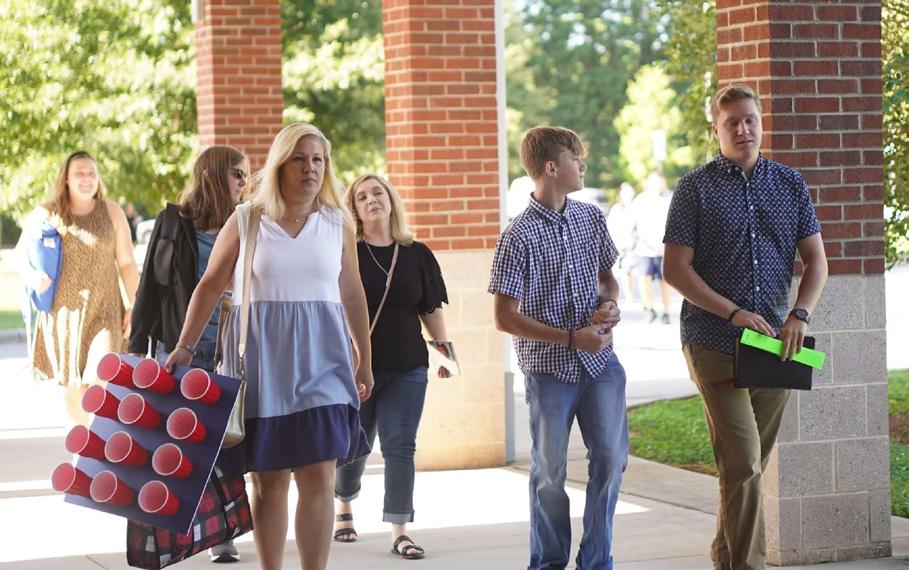
God didn’t mean for us to do life alone, and He certainly didn’t mean for us to do ministry alone.

In every ministry, lay people are important to the work of the church, but as a church plant, their importance is magnified greatly.
When our family moved to Hickory, North Carolina, to plant a church, we had ten people on our team including associate planters Jonathan and Heather Huff. During itinerate, we made more connections in Hickory, and a couple joined us from another Free Will Baptist church where the pastor encouraged his congregation to pray about taking part in our work. Eventually, we gathered a launch team of 22 people. These adults now serve as leaders in different areas on Sunday and in our small groups.
We are a “portable” church plant that meets for services in a local school. This means it takes a great deal of work to get our space ready for Sunday mornings. Established church pastors who visit are always amazed at what we do to make our meeting space inviting and practical. Pastor Brandon always explains we can do so much each week because of our great team!
Each Sunday, our team arrives at the school by 7:00 a.m. They cover the gym floor, move tables into the cafeteria, and begin wheeling in carts with our equipment. Each case is delivered to its specific area, and those serving that Sunday begin setup. Each team member has taken ownership of his or her area and makes it all come together. We work hard on Sundays to prepare the space for our guests. After we finish setup, we gather for a team meeting, go over the service, share announcements, have a devotion,


and spend time praying for the Lord to minister to those who come.
As church planters, we cannot carry out our ministry without partners across the country, and we definitely cannot do it without our local team that serves faithfully week in and week out. It is so rewarding for our team to see new visitors come in or other guests return because of the hard work these dedicated people put in each week. It’s even more rewarding when those guests eventually desire to become part of our serve team. Because of the nature of a portable church, we have many opportunities for service: hospitality, greeting, kids’ check-in, pre-k, nursery, production, worship, Equip Kids worship, security, setup, tear-down, and signage.
We have tried to make it easy for volunteers to get involved. Current volunteer leaders train the new volunteers so they, too, can serve and fulfill their calling. Spiritual gifts and personality assessments have proven helpful in guiding volunteers to ministry areas that fit their gifts and talents.
One area of huge growth has been among nursery volunteers. These workers are vital to a church plant. Many visitors who have never been in church before, or who have been out for a long time, won’t even consider a church without a nursery. It is also important for a mother to have a place to take her little ones so she can be spiritually fed during the service. When we launched six months ago, only two team members were available to work in the

We are all called to serve the body of Christ! Consider taking these steps to service.
1. Pray for God to give you a heart for service no matter how humble the need.
2. Continue to practice healthy spiritual habits in your personal life.
3. Ask your pastor or church leadership for guidance.
4. Consider taking an assessment designed to help you discern your spiritual gifts.
5. Commit to serving in one specific area and follow through with that commitment.



nursery. Now we have five! This growth has allowed us to avoid exhausting our current nursery volunteers and allow them to be in worship services more often.
Because our serve team is so valuable to our ministry, we need them to have time to rest and just worship, so we’ve made it a point to give volunteers one Sunday off each month. We don’t want anyone to experience burnout. We know we cannot fulfill the calling God has placed on our lives without the team He has sent us.
Whether a church plant or established church, a ministry can’t survive on the work of the pastor and hired staff alone. Lay people are vital to ministry. Teamwork is crucial in ministry, and different callings and giftings are valuable to ministry. God didn’t mean for us to do life alone, and He certainly didn’t mean for us to do ministry alone.
Whether you are simply putting out chairs or being the smiling face visitors see when they walk through the door, everyone is important. Working as a team, we can fulfil God’s calling on our lives and see each of our churches grow for His glory.
About the Writer: Brandon and Shelly Smith are the lead church planters at Equip FWB Church in Hickory, North Carolina. They serve with associates Jonathan and Heather Huff and Equip’s amazing team of volunteers. Each week, they seek to equip families with biblical truth to face everyday life. The Smiths have three sons: Landon, Jordan, and Joshua.
North American Ministries (NAM) is happy to announce the approval of new associate church planters Daniel and Darby Lindsay. The Lindsays will serve at Summit FWB Church in Missoula, Montana, alongside Josh and Kimberly Hampton and Clayton and Tammy Hampton. Before joining the ministry at Summit, Daniel and Darby were faithful members of South Highland FWB Church in Muscle Shoals, Alabama. They have two sons: Duncan and Drake.
According to local surveys, over 90% of Missoula County is unchurched, revealing a desperate need for gospel-focused ministry in the area. Please pray for the Lindsays, the Hamptons, and the team at Summit as they work together to change these statistics and reach the Pacific Northwest with the hope of Christ.
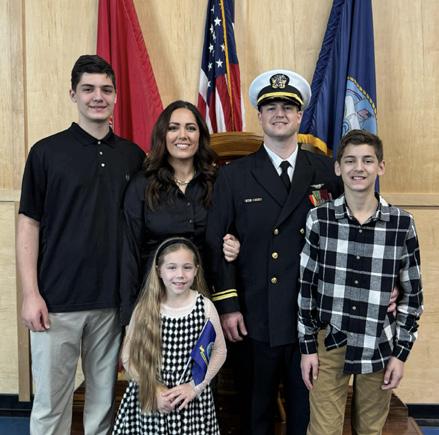
LTJG Josh Alderman graduated from Officer Development School in Newport, Rhode Island, in February and from the Naval Chaplaincy School located at Naval Station Newport in April. He and his family are now serving at their first duty station in Santa Rita, Guam, where Chaplain Alderman ministers as a naval base chaplain.
Please keep the Aldermans in your prayers as they embark on this exciting new chapter of service and ministry to our nation.
North American Ministries has partnered with Teamwork Missions to offer meaningful mission trips to NAM church plants. Teamwork Missions is a non-profit ministry that specializes in facilitating youth and church mission trips, mission trip excursions, and Christian heritage and history experiences. The goal of Teamwork Missions is to engage, equip, and encourage students to build a life of faith and service through unforgettable missions experiences. To learn more about scheduling a mission trip to available NAM church plants, visit fwbnam.com/teamworkmissions
Joe and Kari Jamison were recently approved to serve as associate planters at The Well FWB Church in Ypsilanti, Michigan, joining lead planters Greg and Hailey Smith. The Jamisons are Oklahoma natives and previously served as members of the West Tulsa FWB Church. They have two sons: Jace and Sullivan.
Ypsilanti has a population of 20,000 and lies 35 miles west of Detroit. “Ypsi,” as it is commonly called by locals, is diverse and growing with a dense population of Muslim and Hindu culture groups. A great need exists for healthy
churches and gospel-centered ministry in this area.

Family
On February 25, shortly after the Jamisons arrived in Ypsi, The Well officially launched with 156 in attendance. As the service started, volunteers had to bring in more chairs! Pastor Greg Smith preached a powerful message on “Starting Strong” from Ephesians 6. Please pray for the Smiths, the Jamisons, and their entire team as they continue making disciples in Ypsi and beyond!



The Army is an institution made up of many directives. To provide ministry and impact the lives of those on the front lines of our nation, you must be part of a team. And to be an effective team member requires well-managed relationships.
The same is true for chaplains. If you are going to be an effective missionary in the chaplaincy, you must establish strong and faithful relationships throughout your unit, installation, and the branch of service itself. Competence is measured at every level, forming a reputation that can open or close doors of ministry within your career. To effectively fulfill the Lord’s calling to reach the lost, chaplains must grow three vital relationships.
With the Lord. The strongest of these relationships is with the Lord. Each day presents an opportunity to draw closer to our Redeemer and know Him as a friend. This relationship instills such hope within our hearts it demands to be shared with others. A passion flows from this first love. Soldiers are excellent at picking up on authentic leaders. They appreciate a chaplain whose authenticity and passion speak to a genuine faith, who will walk alongside them through the good and bad experiences of life.
With the Family. Many service members struggle to balance military life and family life. Many younger service members look to their leaders — including their chaplains — for examples of how to prioritize family in a healthy way. Modeling a healthy family life may provide the most natural way of helping those watching transition
into a healthy church life.
With their soldiers. Finally, chaplains must develop strong relationships with the soldiers they serve. With gospel faith as the unifying ingredient of fellowship, soldiers who attend chapel services learn and grow from the broader spiritual example of believers from various cultures and ranks.
Chaplains who have their priorities aligned with Christ, their families, and their congregants will develop a reputation for serving others in the secular world. Their activities will make them known far and wide as individuals who care and share with an eternal perspective. This type of ministry is contagious, meaning others will want to share in the experience. As needs arise, leaders at every level will look to support this type of leader, because good leaders know the value of great and authentic hope.
Serving your unit, your chapel, and your local church is all a part of God’s plan for uniting various Christ-centered denominations and leaders to work together in proclaiming the good news and demonstrating the hope of life in Christ to a lost and searching world.
Let’s serve Him together!
About the Writer: CH (LTC) Tracy Kerr is a seasoned Free Will Baptist Army chaplain, currently serving at Fort Liberty in North Carolina. Chaplain Kerr is a Welch College graduate and received his M.Div. in Christian counseling from Southeastern Baptist Theological Seminary in 2007. He and his wife Ginger have three children: Sarah, Grace, and Jonathan.

Continued from page 25 Chaplains serve as pastors to military members around the world through worship services and Bible classes, during illness, when death occurs, and during times of war and conflicts.
Through many dangers, toils, and snares I have already come;
’Twas grace that brought me safe thus far, And grace will lead me home.
When Florence Chadwick stepped from the beach into the waters of Catalina Island to swim to the California mainland, she was already an accomplished swimmer who had crossed the English Channel. On this day, however, heavy fog had settled in, and she couldn’t see well. She swam steadily for 15 hours, but several times she begged to be taken out of the water. Those in the accompanying boats around her urged her to continue, but she finally gave up, only to discover she had been a scant half-mile from shore. In her press conference she observed, “I do not want to make excuses….But I think that if I could have seen the shore, I would have made it.”
Two months later she tried again, and this time she succeeded.
If we can only “see the shore,” we too can make it. Not only have other believers already made it to that shore, but God Himself has also called. On that day, we shall
behold Him and be changed. And with this picture and promise in front of us, we can get back into the (sometimes cold and threatening) water of this life and keep swimming.
God’s character and power are such that He can guarantee our final salvation. As I mentioned earlier, we must persevere and continue in the faith. Make no mistake about that. But the final and finished product is dependent upon the faithful God who calls us. He will do it! My role is to submit every area of life to Him, obey Him, and trust Him with my future.
We started with a children’s song, so allow me to conclude with another song that captures the picture and promise of this prayer:
And when before the throne I stand in Him complete, “Jesus died my soul to save,” My lips shall still repeat.
About the Columnist: Dr. Barry Raper is associate dean of Welch Divinity School and pastor of Bethel FWB Church near Ashland City, Tennessee.
When we arrived in Missoula, Montana, in spring 2019 to begin planting Summit Church, one of our first priorities was building relationships so we could begin building a team. Teams are essential to any church ministry.
In our unique circumstances, arriving in a community where we knew no one meant building a strong team was vital. While there were many considerations in building a team, stability was the most important factor. We quickly realized we were outsiders in a community that does not like outsiders. We needed locals who had spent their life in the greater Missoula area to become part of our volunteer teams at Summit Church. A local team would instantly give us the stability and credibility we needed to become insiders in the community.
Once we identified locals as a priority in our team building, the focus shifted to determining the specific types of teams we needed to be successful at Summit Church. After much prayer, visiting local churches, and researching the area, we decided to make a strong “first impressions team” our priority. We discovered most first-time guests decide within five minutes whether they will return a second time. We learned a church can survive some nervous teaching, a few missed music notes, or a boring sermon series, but it cannot survive an unfriendly, unwelcoming church environment.
Understanding we only had five minutes to influence our guests, we realized we needed to start the welcoming experience right in the parking lot to create more opportunity to make a positive impression for Christ on their lives. We did this by creating first-time guest parking spots and ensuring our first impression team was waiting outside the church building to greet guests and regular attendees. This was difficult at times, with the harsh, Montana winters. But even in the winter, our first impressions team was faithful to be outside greeting guests. We also realized closed doors give a negative feeling, so our team always held the doors open so guests would feel welcomed.
It didn’t take long to realize coffee is a way of life in Mis-
soula. We knew we needed free, high-quality coffee at church every Sunday and decided to build a coffee team at Summit Church. So, after welcoming them in the parking lot, our first impressions team walked guests into the coffee area and handed them off to the coffee team.
I realize this all may sound strange — maybe even like we are watering down the power of the gospel by “enticing” people to church with good coffee and friendly faces. Those thoughts are something we prayed through. Ultimately, we realized greeting people in the parking lot with the first impressions team and welcoming them brought their anxiety levels down about visiting church. Then, when the first impressions team handed them off to the coffee team, who served them a hot cup of Summit Blend Coffee, their anxiety continued to drop, and they began to feel more comfortable. Once they felt welcomed and comfortable, we noticed guests began to hear and receive the gospel with less worry and fewer distractions.
Our goal as ministry leaders should be to create a welcoming church environment where the gospel can thrive and be replicated. At Summit Church, our first impressions and coffee teams have been a huge part of seeing people come to know Jesus.
Having proper volunteer teams in place is critical to both the success of the pastor and the growth of the church.
Tap into your community and your congregation. You may not need a coffee team at your church, but understanding your area’s unique needs and your congregation’s specific strengths will allow you to discern the type of teams you should consider building to effectively engage your community and reach them with the gospel.
About the Columnist: Josh and Kimberly Hampton are NAM church planters at Summit FWB Church in Missoula, Montana. Josh, the son of fellow Summit planters Clayton and Tammy Hampton, felt a strong calling from the Lord to plant a church in this widely unreached region. Together, the Hamptons and their team are making a tremendous gospel-impact in their community. Josh and Kimberly have two children: Taylor and Colton.
Once they felt welcomed and comfortable, we noticed guests began to hear and receive the gospel with less worry and fewer distractions.


Having proper volunteer teams in place is critical to both the success of the pastor and the growth of the church.
Teams are essential to any church ministry.
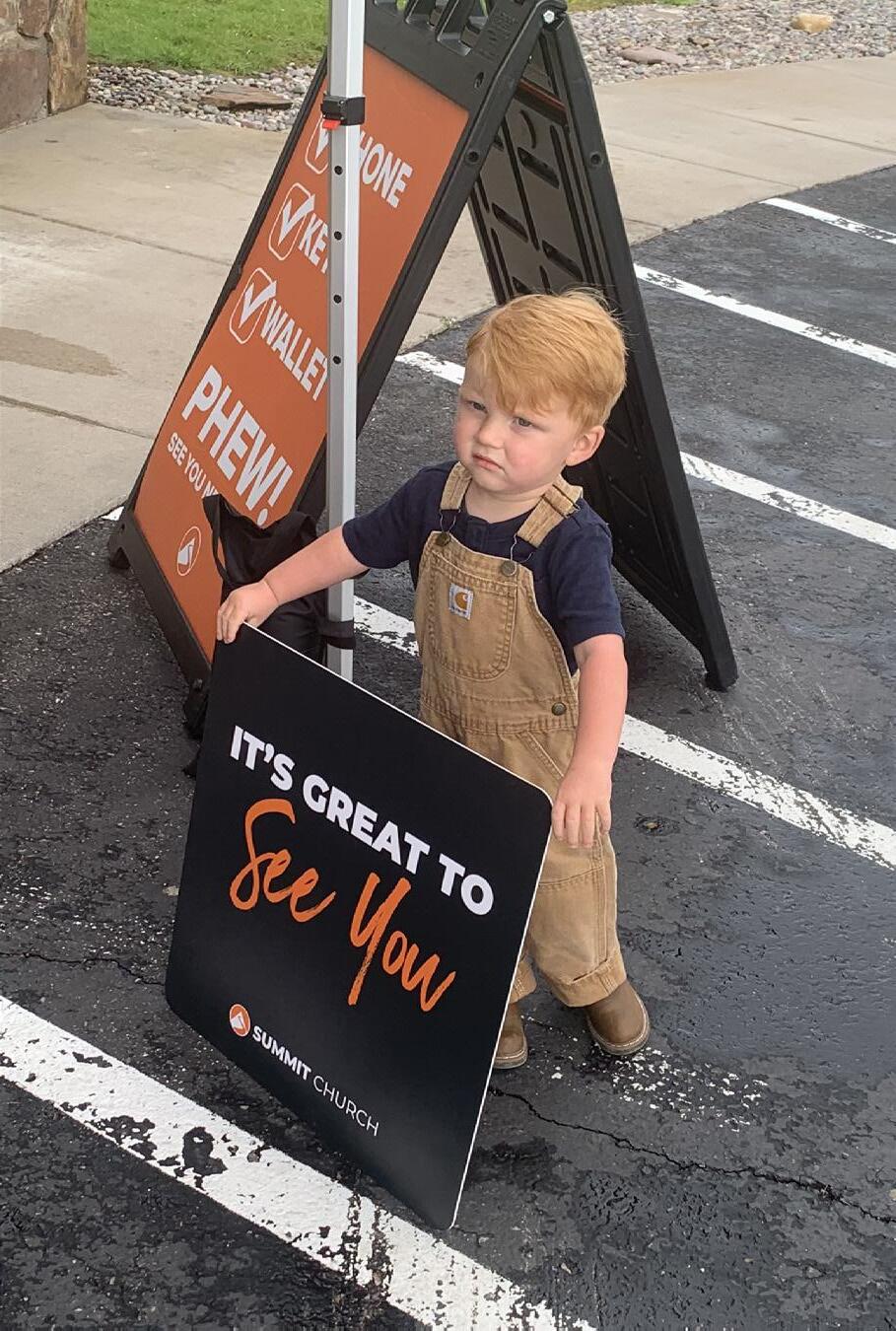
Tampa, FL— Plans are underway for IMPACT Tampa Saturday, July 20, in beautiful Tampa, Florida. IMPACT is the annual, one-day service and evangelism campaign held in conjunction with the National Convention.
Volunteers will gather at First FWB Church Tampa at 9:00 a.m. While the church will help provide transportation to service locations as needed, transportation will not be provided from the downtown hotels.
Two service projects are available this year. The first project includes assembling and distributing hygiene kits to the homeless. Volunteers will work with the local Salvation Army for delivery suggestions.
Supplies and donations are needed to accomplish this project. Gather and bring supplies with you to the convention or donate to Master’s Men for the purchase of supplies. Make donations online at fwbmastersmen.org/donate or mail donations to Master’s Men, PO Box 5002, Antioch
TN 37011. Please mark donations “IMPACT Tampa." Find a supply list at fwbmastersmen.org.
Those volunteering for the second project will partner with Faith Tampa to serve at local elementary schools with cleaning and beautification projects. More details will be announced soon.
Please register your group at fwbmastersmen.org/ IMPACTTampa to help make an impact on the Tampa area for Christ.
Dothan, AL— Golfers enjoyed another great year at the Master’s Men Deep South Golf Tournament in Dothan, Alabama, April 3-5.
Although the tournament week began with rain and cloudy skies, the weather could not have been more perfect for the final day, and scores reflected it. Championship Flight first place winners were Tim Baumgarten and Don Dease. Second place went to Tommy Ellis and Brandon Beecher, with Riley Young and Todd Tilley in third place.
First Flight winners were Jason Croad and Tim West, while Allen West and Daniel West claimed the secondplace trophy.
Master’s Men director and tournament organizer Ken Akers said, “Thanks to all the golfers and sponsors for their support, and congratulations to our winners. We look forward to meeting on the green again next year!”
For ongoing updates about the 2025 Deep South Tournament, visit FWBMastersMen.org





 BY DAVID BROWN, CPA
BY DAVID BROWN, CPA
At one time, things were built to last in the United States. This is no longer the case. Recently, my wife and I bought a new television. We were looking for a large screen for our upstairs area. We had narrowed our choices and began to ask the salesman about the differences between the sets. He told us the main difference was how long they would last. He indicated the more expensive models could be expected to last four or five years, while the cheaper ones would last only two or three. I was shocked; we had enjoyed watching our current television for four or five years.
The salesman was setting us up for planned obsolescence. The idea is that you must replace your TV every three or four years, either because they really do wear out, or because the old set is so far behind the times. Perhaps we will want to upgrade from 4k to 8k or even 16k. (There is a great deal of debate about whether the human eye can really tell the difference between 4k and 8k without getting super close to the screen, and why would anyone want to watch TV from a foot away?)
We live in a world where manufacturers either make their products in such a way you wish to replace them with something newer, or they make them where they cannot be repaired if they break. Sometimes they are hard to repair because they no longer use smaller parts that can be replaced individually; instead, they must replace a large part that incorporates all the smaller parts. The new integrated part may cost so much it simply makes more sense
to replace than to repair the product.
Another method is to only make replacement parts for a limited time. Copiers fall into this category because they don’t want you to buy the copier but do a five-year lease. If you buy the copier, after it gets to be six or seven years old, they quit making parts for the “obsolete” copiers. They prefer ongoing five-year leases, which produces steady, reliable income for the company.
Around 70% of the American economy is driven by consumers. It seems many companies want to force consumers to repeat business more often than necessary to drive up their own profits. Does anyone make products built to last anymore?
Economists use the term “durable goods,” which is defined as goods you do not have to buy very often. Bricks for a house are considered durable goods because they could last a lifetime or more. This category must be getting pretty small. Automobiles are still considered to be durable goods and, honestly, last a long time. However, with new technology and driver assist features on newer models, will older cars (you know, the kind you actually have to drive yourself) soon become obsolete?
Welcome to the world of planned obsolescence.
About the Columnist: David Brown is director of Free Will Baptist Foundation. To learn more about the grants program, visit www.fwbgifts.com.

On January 3, 1944, The Cedars of Lebanon Seminary (a Free Will Baptist theological seminary) was founded in Pinar del Río, Cuba. Thomas H. (Pop) Willey was the driving force behind the seminary. Conceived as a center for theological training, the institution purposed to promote missionary growth within the emerging Free Will Baptist Convention in western Cuba. Several students enrolled for this initial stage.
Pioneer missionaries played a fundamental role in the rapid growth of the FWB Convention of Cuba, the fastest-growing work in Cuba during its first 18 years. Missionary work was closely linked to training those who would work in the field. Before the seminary was founded, only two or three young (or newly founded) Free Will Baptist churches existed, so we cannot speak of the local church as the genesis of Free Will Baptist theological education in Cuba. Rather, theological education led to a strong missionary movement, contributing to growth among Cuban Free Will Baptists.
From a biblical perspective, a symbiosis between theological education and the local church is evident. When we analyze the Great Commission in Matthew 28:19-20, the spread of the gospel is an exercise in theological education: go and make disciples, teaching them to obey all things. But theological education also depends on the local church, which nurtures seminaries and is the reason for their existence in training and forming the servants of God.
The seminary experienced three important phases.
After being founded January 3, 1944, over the next 18 years, the seminary graduated 45 students who served in various Free Will Baptist churches in Cuba. In April 1958, the date of the last graduation, the seminary closed for maintenance. The doors did not reopen for 30 years.
BY BORIS SARLABOUSAfter the communist revolution in 1959, our seminary was not authorized to reopen. Miraculously, in 1986, the school received authorization to resume its teaching program. While closed, the seminary’s importance in Cuba became evident. The missionary process was significantly hindered. Many pastors were forced to study in other seminaries or work in ministry without training. Churches called pastors from other institutions, creating a problem in many cases for the convention. Many churches disappeared. Pastors had to shepherd more than one church at a time. These and other challenges clearly demonstrated the importance of the seminary in pastoral and ecclesial theological education.
More recently, an even deeper working relationship has emerged between the local church and the seminary. Through satellite biblical and theological study closer to the local churches, more people benefit from the seminary. These extensions have several important objectives:
• Bring theological education closer to the local church.
• Be a training tool and play a role in church growth.
• Provide space for non-believers.
The Cedars of Lebanon Seminary has always been the backbone of missionary growth in the Free Will Baptist Convention of Cuba, but it has also been much more. While educating pastors and missionaries was always foundational for the seminary, in recent years the seminary has become a vital tool for leadership development and discipleship in local churches.
The seminary has extended its vision to train local leadership by establishing Bible institutes in local churches, conducting

discipleship courses, and providing leadership training led by the church’s pastor. These institutes, created and endorsed by The Cedars of Lebanon Seminary, consist of three modules: a basic module invites new converts to be disciples on their journey to becoming church members, an intermediate module, and an advanced module. Upon completing these three modules, the student has completed the first year of associate studies in our seminary. Students may continue their studies at the seminary or the nearest extension school as desired.
Furthermore, these extensions have provided theological education for numerous pastors, missionaries, and church leaders. The extension schools arose from the growing number of those called to serve God in their local churches or presbyteries but unable to travel to the seminary or study full-time. We set a goal to create an extension in each presbytery in our convention. These extensions are tended by local pastors who have a minimum of a bachelor’s degree in theology and Bible and are supported by a group of professors from the seminary faculty. Students from these extensions achieve an associate degree in Bible and theology, with the opportunity to continue undergraduate studies in person at our main campus. As the convention saw students complete extension studies and continue their education, it led to a second training center in the eastern part of the country.
While evangelization and missionary work contribute to church growth, discipleship becomes the tool to help new believers in their walk with Christ. Churches with solid discipleship programs have fewer desertions, and fewer new believers succumb to false doctrines and unhealthy practices, forming a solid foundation of thought against heresies.
A brief statistical analysis shows 40% of the pastors who graduated from the seminary in the last ten years studied in a seminary extension. Furthermore, 100% of the local leaders trained in the seminary completed studies in one of the seminary’s extensions.
Clearly, seminary extension schools and Bible institutes in local churches are crucial to the discipleship and training of Free Will Baptist leaders in Cuba.
About the Writer: Boris Sarlabous is the director of the 80-year-old FWB seminary in Cuba, Los Cedros del Líbano, with a campus on the western side of the island and another one on the eastern side. He is currently pursuing a Ph.D. degree in Ecclesiology. Boris is married to Ana Marys, and they have three children.
Eighty-five percent of senior leaders of Bible-believing churches in the majority world have never had formal biblical or ministerial training. What an astonishing statistic! Obviously, this offers fertile ground for the development and propagation of misguided teachings, even by well-intended preachers and teachers.
It is not surprising false teaching abounds. How can we expand rapidly while ensuring the genuine gospel message is proclaimed and sound doctrine is taught? The best way is to quickly establish training programs to ground leaders in the basic truths of the Scripture and give them tools to plant and grow healthy churches.
These training programs are important for: 1) providing biblical instruction, equipping ministerially, and enabling and releasing for mission; 2) providing leadership for sustained growth; 3) diminishing outside dependency; 4) giving sustainability to nationally run works; and 5) preserving Free Will Baptist identity.
IM has intentionally focused on setting up training programs in all our fields and partnerships. Our strategic goals call for us to be involved in 12 such programs by 2025, which we surpassed last year.
1. Scarcity of training materials in the local language often requires the translation of materials.
2. Each field has unique needs. Training must be adapted to different levels and a variety of time schedules and locations of those being trained.
3. Creative methods of training delivery need to be developed to reach the greatest number of those who need it.
4. The local availability of technology to permit the multiplication of resources.





Bulgaria — Women from the New Life churches in Bulgaria gathered for a retreat March 21-24. Seventy-seven women attended the first retreat in five years. Ruth McDonald, former missionary to Japan and WNAC executive secretary, provided three sessions aimed at seekers and young Christians.
Pakistan — Free Will Baptists in the Lahore area of Pakistan minister to extremely poor people who work in brick kilns under semi-slavery conditions. They provide them with food and share the Bread of Life.


Bangladesh —
In 2022, representatives from the Khumi people of eastern Bangladesh attended a seminar on Bible translation organized by IM partners, Word of Life. They set up a translation team and continued training to get the New Testament into their heart language, currently unavailable. In 2023, the translation team was put under house arrest for political and religious reasons. Word of Life had no contact for eight months and assumed the translation project was on hold. Recently, contact was reestablished, and amazingly, the team had used their confinement to concentrate on Bible translation. They finished the first draft of 22 of the 27 New Testament books and hope to have them all completed this summer. “Praise the Lord for the faithfulness of this Khumi team,” said Kenneth Eagleton. “This is one of seven teams working on Bible translations. Pray for these teams.”

Cuba — Pastor Leandro Pozo of the Guanabo FWB Church baptized six people in the ocean on Easter Sunday.

Cuba — Cuban believers filled The Cedars of Lebanon seminary campus for their national conference February 23-25. Saturday evening, they celebrated the 80th anniversary of the seminary. One of the first students and a member of the first graduating class, 102-yearold Benito Rodrigues, delivered video greetings. Kenneth Eagleton, director of global partnerships, attended the convention, met with the Executive Committee, and preached Saturday morning.
Côte d’Ivoire — Nassian FWB Church in northeastern Côte d’Ivoire celebrated Easter with 15 baptisms. Afterward, the newly baptized believers received certificates and joined Pastor Edmond Kouadja and the rest of the congregation in Communion.


France — Joel and Lydie Teague headed up a team holding the first JPense event in two years in Nantes, France. On January 27, almost 300 people filled the rented space. Many were nonbelievers who provided positive feedback, saying the event made them think. Thirteen people signed up for discussion groups that began in April. Two people registered for more advanced Bible studies. “Please pray that what they heard will stick with them, and they will seek answers,” Lydie requested. “Pray those who signed up for advanced studies will come to know Christ.”



MAY 13, 1929 – MARCH 1, 2024


Appointed as missionaries to Uruguay in 1960, Paul and Amy departed for language school in Costa Rica in August 1961. They teamed with Bill and Glenda Fulcher to plant churches along the border of Brazil. Working in rural areas outside the border-town of Rivera, the Robinsons also developed a camp for church members. The Robinsons retired from missionary service in 1992, after 32 years of service with IM. They continued ministering to Hispanics after they settled in Smithville, Tennessee.

Recently, an episode of Antiques Roadshow from PBS featured a Free Will Baptist book published in 1880. Not only did the volume contain a century of history from northern Free Will Baptists, but it also included letters from Frederick Douglass, Harriet Beecher Stowe, and others thanking Free Will Baptists for taking a strong stand against slavery. Mrs. Stowe reflected on "the comfort it was to me...to come upon the record of the Free Will Baptists and see how they honored Christ in the person of his poor afflicted ones." Her words provide a good reminder that Free Will Baptists have always been concerned about reaching out a helping hand to those who need it most.
Keep that legacy of helping others alive with a gift to The Together Way Endowment at FWB Foundation.















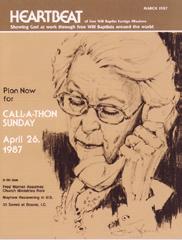
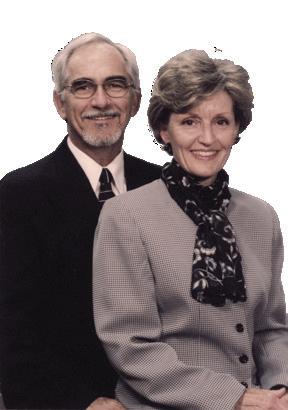







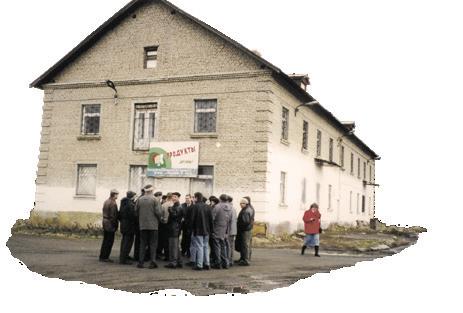






Missions lies at the heart of our faith. It is not a new calling. It is as vital and relevant today as it has ever been. From the early disciples spreading the good news of Jesus across the globe to believers today breaking new ground, missions remains a pillar of our faith and practice.
Engaging in missions work can be a transformative experience for Christians. It can help us grow spiritually and find a deeper connection to our faith and Lord. Missions participants often gain new perspectives, develop empathy and compassion, and experience a sense of fulfillment and purpose through serving others. Missions also makes a great impact on the local church. When members of a local church serve together in missions, it has a way of cultivating a greater sense of unity, purpose, and fervor for the Kingdom.
This was the experience I had when I had the opportunity to go on a short-term mission trip with my youth group. It was an awesome opportunity to be the hands and feet of Jesus. Through a partnership with the local church where we served, we were able to serve that church, its community, and the Lord in a multitude of ways. Not only did we bless those we served, but the experience blessed us as well and helped us become more effective in living out our faith at home.
I would venture to say most churches believe in missions and have a desire to support mission endeavors. The challenge for churches and individuals can be funding these important ventures. For some, it may be lack of resources. For others, it may be lack of planning. However, smart investing of financial resources can play a vital role in ensur-
If your church is interested in the Free Will Baptist Board of Retirement’s Institutional Investing Program, contact their office at 877-767-7738 or visit boardofretirement.com .
BY CHRIS COMPTONing sustainable funding for missions, both now and in the future. Here are three considerations for churches who want to be better prepared to fund missions and mission trips.
• Develop a financial plan. The starting point for every church should be a financial plan that aligns with their missions’ objectives. Consider your current financial picture. Assess your cash flow, assets, and liabilities. Make funding missions a priority in your budget.
• Invest funds for the long-term. To help fund missions, churches should consider investment opportunities. Smart investing can help churches grow financial assets, generate additional income, and establish a solid foundation for funding mission trips and other missionary endeavors in the long term. The Institutional Investing Program through Free Will Baptist Board of Retirement provides a vehicle for churches and ministry organization to invest funds for missions and ministry purposes. Churches can invest funds and let earnings compound and increase their funding capacity.
• Get involved and go! Churches need to be involved in missions. The world needs missions-minded churches. Though talking about money is often uncomfortable, the reality is that money makes missions work a reality.
Smart investing makes funding missions sustainable for the long-term. Consider developing a financial plan, invest funds for future ministry, and watch the Lord bless your efforts.
About the Writer: Chris Compton is accounting administrator for the Board of Retirement. He graduated in 2007 with an M.A. in Bible exposition from Columbia International University. A 1998 graduate of East Tennessee State University, he has over 18 years of administrative and financial experience in varied fields, along with seven years in pastoral ministry.

Over the last 55 years, the National Association of Free Will Baptists Board of Retirement and Insurance, Inc. (our official name) has grown. It has provided reliable savings and stable income for pastors, missionaries, teachers, and ministry workers. When we considered a transition in our name, we wanted to recall Free Will Baptist history and heritage, which brought our denomination together and moved us forward. Richland Avenue represents the denomination’s first effort to create national offices for our departments to serve the denomination more efficiently. We are proud of our heritage and where we come from. We want to honor that heritage during the next phase of our ministry’s growth by developing more relationships with Free Will Baptist pastors and workers who may not pastor or work in Free Will Baptist churches or organizations. This would allow churches and ministries the opportunity to care for their ministers and enable us to offer more benefits and growth for the denomination.
The Board of Retirement had already operated under a few titles by the time it was established in our 1969 charter. Originally called the Board of Superannuation, the department was established at the 1935 organization meeting of the National Association. Superannuation simply means “regular payment made into a fund by an employee toward a future pension.”
General guidelines for the Board were approved four years later at the 1939 convention in Bryan, Texas. Mrs. J.E. Simpson, dean of women at Welch College for many years, served as the first chair. The purpose of the National Superannuation Board was three-fold: to provide for a minister’s family in the event of his death, to furnish regu-
lar income in case a minister should become permanently disabled, and to ensure income for the minister during retirement years.
Our title was adjusted to National Superannuation Board or National Board of Superannuation. (Various records use it both ways.) At that time, several national organizations were operating, but they were not in a central location. The denomination wanted a place for national departments to be centralized and able to work together.
In 1953, the denomination purchased its first National Headquarters building on Richland Avenue in Nashville, Tennessee. The new building centralized all existing Free Will Baptist agencies. On July 15 of that year, the building was purchased for $19,000 ($220,000 in today’s dollars). The headquarters was two blocks from the original Welch College (Free Will Baptist Bible College) campus. This was a historic moment for the National Association, bringing together agencies and establishing a model of unity that still exists today among our national departments.
The purchase of that first building on Richland Avenue put all the national departments together in the same location and allowed agencies to work together to move Free Will Baptist efforts forward. Sharing resources allowed the denomination to support one central effort to make the work of the whole stronger.
In early 1969, a new pension plan, formulated and implemented by North Carolina pastor Herman Hersey, came to the attention of the National Board of Superannuation. They studied the plan, endorsed it, and requested it be extended to the entire denomination. At the national


convention that same year, the National Association adopted the plan and renamed the National Board of Superannuation to the Board of Retirement and Insurance.
With every transition/name change, the department has increased services and benefits for our denomination. At the national this year in Tampa, Florida, we are proposing another transition. This name highlights that original headquarters building and the spirit of denominational unity that brought the National Association together. We continue to enhance the benefits and services we provide the denomination in ways that help to increase that denomination in the process.
We have chosen Richland Ave Financial as a name that both honors our heritage and calls back to the spirit of working together for the benefit of the whole denomination.
We are proud of where Free Will Baptists have been, and we are excited about where the Lord is leading us in the future as we work together to further the gospel and His Kingdom by caring for the workers He has called.
About the Writer: John Brummitt became director of the Board of Retirement in January 2016. He graduated in 2011 with an MBA from Tennessee Tech University. A 2004 graduate of Welch College, he has been with the Board of Retirement since spring 2006. Learn more about retirement options: www.BoardofRetirement.com.

Do you remember the Ten Commandments? No, not the classic movie starring Charlton Heston as Moses, but the actual Ten Commandments from Scripture? Perhaps you can quote them and probably would agree it’s still important to remember them.
At one time, the Ten Commandments were posted without controversy in American classrooms, daily reminding young, developing minds of the laws God gave Israel. Even after the Ten Commandments disappeared from school settings, churches continued to display pictures of the stone tablets Moses received on Mount Sinai. Today, however, it is rare to see a copy anywhere, but the principles taught in these laws are as important as ever.
The Ten Commandments are the basis for the legal systems of Western Civilization — the laws of the land that protect our lives and property. What we call common law was written to govern human interaction and to maintain peace and equality. It was also the purpose for some of God‘s laws about how we should interact with Him.
One of those commandments says “Remember the sabbath day, to keep it holy” (Exodus 20:8). There was once a day in America when the sabbath (Sunday for New Testament believers) was revered and kept holy, even by people who didn’t claim to be religious. Sadly, today, adherence to this fourth commandment is slipping by the wayside even among God’s people.
Do you remember Blue Laws and what they were all about? Blue Laws prohibited certain types of commercial activity on Sunday, especially morally offensive activities such as gambling or drinking alcohol. Also called “Sunday

closing laws,” Blue Laws originated in Europe, came over with the Puritans in colonial days, and have been part of America’s legal history since. In the nineteenth century, state and local governments passed laws preventing many businesses from operating on Sunday. Although the laws were clearly based on Christian beliefs, the U.S. Supreme Court later ruled the laws do not violate the First Amendment's Establishment Clause.
Most Blue Laws have been repealed since the 1960s, but those banning the sale of alcohol on Sunday remain in some areas. Around the turn of the twentieth century, Blue Laws were amended and exemptions permitted with confusing results. For example, a hardware store could be open on Sundays and the proprietor could sell nails but not hammers.
Following World War II, the expanding economy brought new products and increased customer demands. More businesses stayed open, and few Sunday closing laws were enforced except for the sale of alcohol. Still, most Christians resisted the change and continued to avoid non-essential business on Sunday.
In a 1961 test case, McGowan v. Maryland, the Supreme Court resolved the constitutionality of Blue Laws in Maryland, which required most businesses to be closed on Sunday, while others (such as hospitals) were deemed necessary and exempt. If department stores opened on Sunday, they could sell only specific retail items: candy, milk, bread, fruit, gasoline, oil, grease, tobacco products, drugs, medicines, newspapers, and magazines.
1. Prepare for worship on Saturday by preparing clothes, planning meals, and getting an early bedtime.
2. Attend church faithfully.
3. Rest.

4. Focus on God and His Word during the afternoon and evening.
5. Avoid routine work responsibilities.
6. Carefully consider dining out and entertainment.
The State of Maryland enforced the law, fining department store employees for selling items not found on the exempt list. Merchants and employees appealed all the way to the Supreme Court, arguing the Maryland Blue Law was based on specific religious beliefs, that the laws compelled everyone to observe the Christian day of worship. They claimed it violated the First Amendment's Establishment Clause.
The Court rejected their argument and upheld the Blue Law. Even liberal Chief Justice Earl Warren, writing for the majority, acknowledged that, although the law was originally enacted for religious purposes, it had evolved into secular purposes. The Court said non-religious reasons had been added since the 1700s, specifically that it was good to encourage people to take a day off from work for rest and relaxation. They further ruled Maryland employees could not make an Establishment Clause claim since they did not allege that their religious freedom had been infringed, only that the law had caused them economic harm.
Since this landmark decision, the Supreme Court has not revisited Blue Laws, and they are considered constitutional when supported by a secular purpose. However, in the sixty-plus years since McGowan v. Maryland, most state and local governments have not enforced Blue Laws, and Sunday business has grown exponentially. The one exception still remaining in many states is the sale of alcohol on
Sunday by liquor stores. Some prohibit selling only during certain hours, except for grocery and drug stores.
Aside from the legal aspect, churches in America have basically gone along with and adopted these cultural changes. When Blue Laws were enforced (prior to 1960), most Christians held strictly to the practice of “church and rest only” on Sunday, especially avoiding commerce, housework, gardening, sports, fishing, hunting, swimming, and other non-essential activities.
Church-going wives cooked most of their family’s Sunday meals on Saturday, simply warming up the food, and their families avoided anything that caused others to have to work on Sunday. The few families who could afford to eat in restaurants chose not to go there on Sunday. Attitudes about what was “right” were mostly uniform among churchgoers. Learning a job required working on Sundays, Christians often refused the job offer.
But as the culture changed, what was considered “right” for Christians also changed. The emphasis on Sunday as a day of rest and relaxation has given people a reason to participate in any activity they feel helps them relax. Women working outside the home have limited time for housekeeping during their 40-hour work week. To make every minute count on weekends, some push laundry and other chores into their Sunday schedules. After all, with indoor automatic dryers, no one could see the clothes hanging outside on the clothesline. They also reasoned if they must cook and clean the kitchen, they might as well allow someone else to cook and clean instead.
Back to the fourth commandment, “Remember the sabbath day, to keep it holy.”
Sadly, it seems this commandment has lost its relevance in today’s culture. Or has it? The question really becomes: What does the word holy mean, and how is this relevant to the sabbath? The word holy means to be set apart or different. Exodus 31:12-17 makes it clear God considered this commandment significant, even prescribing the death penalty for those in the nation of Israel who broke it, concluding, “Wherefore the children of Israel shall keep the sabbath, to observe the sabbath throughout their generations, for a perpetual covenant. It is a sign between me and the children of Israel for ever: for in six days the LORD made heaven and earth, and on the seventh day he rested, and was refreshed.”
Continued on page 52
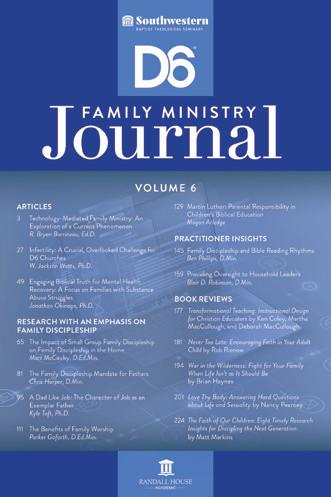
The Southwestern D6 Family Ministry Journal: Vol. 6 is a peer-reviewed journal providing a comprehensive approach to the family ministry conversation by reminding ministry leaders of the various audiences present in the church community. The articles found within bring attention to family ministry and key elements of pastoral duties in connection to discipleship in the home. This journal aggregates content submitted by scholars from various universities, seminaries, and ministry organizations as well as relevant book reviews. An added bonus is practitioner insights in shorter, non-peer reviewed submissions.

The return of Christ is a key promise of Scripture. This book examines the entire New Testament teaching on the second coming of Jesus, emphasizing things we agree upon more than things about which we differ. There’s too much we agree on for disagreements to divide us and rob us of joy in the prospect of seeing Him.


The Super Youth Worker Utility Belt has everything from fun games to lessons with depth. Find practical and versatile ideas to use in weekly preparation or when you find yourself with a last-minute teaching opportunity. No Internet connection necessary.
The study guide is a companion book to Mere Eschatology: A Biblical Study of the Second Coming and the End of the Age This booklet can be used individually or as a group study.
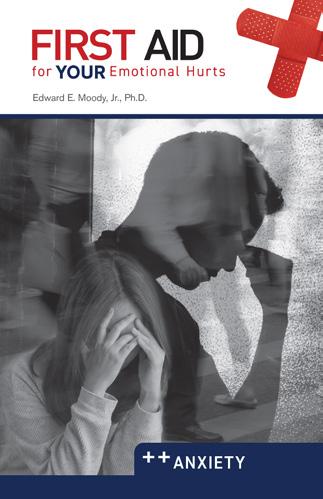
Dr. Moody walks readers through biblical approaches to defeat anxiety. These biblical examples remind us we are not alone in our journey, and the practical exercises provide actions to take to help us grow and achieve victory over crippling anxiety.
Creating Healthy Church Systems challenges pastors to examine the health of their churches. This work aims to equip church leaders to implement eight essential systems every church needs to be healthy and how to build and implement those systems in your church.



BIBLE VERSES
Proverbs 4:5
Proverbs 11:14
Proverbs 15:22
Proverbs 18:15
Proverbs 24:6
Philippians 2:3-4
LEADERSHIP QUOTE
“Making popular decisions is easy; you don't need to be a leader to do that.
The definition of a strong leader is to make decisions that are unpopular, but are nevertheless sound.”
—Henry Bloget
Leadership primarily involves decision-making. Those outside leadership may envy this power, but decision-makers understand the associated heavy responsibility. Some decisions need little deliberation while others fall into weighty categories. Significant decisions require a structured process to ensure optimal outcomes. Leaders should follow three phases: foundation, details, and communication.
The foundation for every decision should be biblical, ethical, and precedential principles. Biblical principles provide the primary filter, guiding biblical servant leadership decisions. Ethical considerations help leaders navigate decisions that may be scripturally or organizationally correct but not universally wellreceived, prioritizing ethical standards over individual interests. Leaders also must consider the precedent set by their decisions, contemplating their future implications and consistency. Can you live
with that same decision every time and for every person who asks in the future?
In the details phase, leaders should avoid a myopic view and hastiness, fostering collaboration from other perspectives. Methods like the “Six Hats” approach encourage comprehensive thinking, averting egocentric decisions and unintended consequences. However, the details should align with foundational and missional principles. Leaders must address root causes for long-term effectiveness, not just symptoms. Leaders need to think beyond the immediate to the long-term.
Communication is crucial post-decision. Instead of merely enforcing compliance, explain the rationale, benefits, and formulation of the decision. This transparency minimizes skepticism and fosters understanding, though not all will agree. Accept that decisions may not always be seen as correct but trust in an intentional, objective process. Live with the decision, adjusting only if necessary.
For the “Six Hats” method, visit: bit.ly/SixHatsMethod
About the Columnist: Ron Hunter Jr. has a Ph.D. in leadership and is CEO of D6 Family Ministry. You may contact him at ron.hunter@d6family.com.
Top Reads for Busy Leaders celebrates four years of providing a curated list each week of relevant articles for ministry leaders. A team of readers finds what they like and submits recommendations each week. Then D6 Family Ministry selects the 12 best from the list and emails the articles to subscribers every Thursday morning. Over the past four years, our readers have read articles from hundreds of writers. D6 Family Ministry has delivered 2,500 articles to the email boxes of leaders who want to be informed.
We are looking for more readers who would like to be part of the weekly submission team. If you would like information on being part of this team, email TopReads@d6family.com. If you would like to receive our complimentary
Top Reads for Busy Leaders email each week, sign up at bit.ly/D6TopReads
Scan here to sign up!


Continued from page 49
Is keeping the sabbath still relevant, or was it only for biblical times?
For those who say this law was temporary and only for Israel, please note that verses 16 and 17 say it is a perpetual covenant, and is to be kept forever. What then does the Lord expect of Christians today regarding the sabbath or the Lord’s Day? It is difficult to determine what that looks like for others, but each of us would do well to determine for ourselves what the terms “holy” and “set apart” mean. Clearly, Sunday cannot be just like any other day. It should definitely include corporate worship, which Christ modeled during His lifetime on earth.
Following COVID restrictions, some found it convenient to remain home and watch a worship service on television, social media, or Zoom. While that may have been necessary, many did not return to public worship services, despite returning to work and most other activities. Have we let convenience replace our commitment to gather with fellow believers?
We are reminded to make this a priority in Hebrews 10:24-25 in the familiar command not to forsake assembling together to worship. Keeping the sabbath also should
involve resting, something most of us need desperately. Even God modeled this behavior after creation. Exodus 31:17 indicates He rested and was refreshed.
The Bible reiterates God’s seriousness about the sabbath. Exodus 35:1-3 explains: “Six days shall work be done, but on the seventh day there shall be to you an holy day, a sabbath of rest to the LORD.” And then, this serious warning follows: “Whosoever doeth work therein shall be put to death.”
God certainly kept His promise. In the Old Testament book of Leviticus, Israel was taken into captivity and kept out of the Promised Land for seventy years to allow the “land [to] enjoy her sabbaths,” which had been violated (Leviticus 26:14, 24, 30-35).
It is clear keeping the sabbath was important to God. The question is, have we as believers today given this day of worship and rest the importance it needs?
About the Writer: Judith Puckett is a happily married, 60-something freelance writer with kids and grandkids. She loves writing, surfing the web, reading, photography, antiques, genealogy, and spending time with friends. Find her book Living by Faith on www.amazon.com
The mission of D6 Family Ministry is helping you build believers through church and home. One way we accomplish this mission is by sponsoring a wide range of seminars at the National Convention, July 22–24 in Tampa, Florida. See program for more details.
“Why Is Everybody Around Me Not Like Me?” by Robert Bryan: Participants will better understand how their personalities affect how they act and react (and why everybody else acts different from them) and how that plays out in ministry.
“God Designed You to Be a Leader (So, what are you waiting for?)” by Robert Bryan: Participants gain understanding about how they can be effective leaders, using their God-given personality.
“First Aid for Anxiety” by Eddie Moody: Dr. Moody will unpack his newest booklet First Aid for Anxiety.
“Confessions From a Not-So-Super Youth Worker: Tips in Using The Super Youth Worker Utility Belt ” by Jon Forrest: Whether you need games to catch interest, ideas to add depth to lessons, or a spur-of-the-moment solution, this session will provide practical ideas for busy youth workers.
“Creating Healthy Church Systems” by Brad Ransom: Healthy churches make more disciples, and health starts with sound structure and systems. This session addresses systemic principles to help churches become healthy and growing.
“Teacher, Scholar, Shepherd: Essays in Honor of Robert E. Picirilli” by Phillip Morgan: Phillip Morgan will share points of interest from the book and highlight Picirilli’s significance within the Free Will Baptist movement.
“The Positive Impact of a Shared Bible Study Plan” by David Womack: Explore the transformative effects of implementing a uniform Bible study plan for all members of your church, making it a more cohesive and spiritually enriched community.
“Did You Say a Teaching Nursery?” by Katie Greenwood: Yes! The babies and toddlers in your church can learn and will love learning about God and His Word. Explore opportunities to teach your youngest attendees and build relationships with their parents.
“Building Blocks to Success: The Foundation of Effective Parenting” by Lena Wooten: Be equipped with hands-on tactics for nurturing your children into self-reliant and thriving individuals.
“Best Practices for a Pastoral Search” by Ron Hunter: Hiring staff can result in the best or worst decision ever. Explore the steps of intentional hiring based more on your goal profile and less on ineffective criteria.
“D6 HomePoint Strategies for Every Day Family Discipleship” by Tim Goodyear: What does at home and along the road look like for families today? Unpack strategies to equip families with practical tools and routines for family discipleship.
“Parenting the Parents of Children and Teen Ministry” by Derek Altom: Find four easy avenues to equip parents to parent their kids better by being intentional through the seasons, conversations, and mentoring opportunities.
“Superpowers of a Great Kids' Ministry Volunteer” by Steve Greenwood: Examine 11 “superpowers” every Christian possesses that can be unlocked and developed to serve Him in the local church as a kids’ ministry volunteer.
“Your Family Discipleship Plan—What Is It and Why it Matters” by Steve Greenwood: Dig into the concept of family discipleship from A–Z and discuss the ingredients that are critical to your personal family discipleship plan.
“Mere Eschatology” by Jeff Crabtree: Crabtree reviews Dr. Robert E. Picirilli’s new book, highlighting the teaching from each section of the New Testament regarding the return of Christ, focusing on the points of agreement and the joy of the Second Coming.
“Understanding and Responding to Infertility” by W. Jackson Watts: How does family ministry apply to the infertile? This session considers common features of infertility including emotional and marital impacts, and providing practical and pastoral responses.
Two additional seminars debrief the 2024 CTS Ministry Expo: one for music and arts categories and the other for the Bible categories. We count it an honor that you would consider attending one of our seminars. Thank you for helping us help you build believers through church and home.



Let’s get something clear! D6 is not a moment. Not an emotion or an experience. Not a conference, a trend, or even a movement. Sure, D6 may include all those wonderful things, but at its core, D6 is a way of life. An ongoing, daily decision to make Christ the center of our lives, and to lead our families, friends, and churches to do the same. D6 is EveryDay discipleship.
In 2024, D6 Family Ministry hosted two conferences to explore this important topic: D6 Northwest in Seattle, Washington, March 21-22, and D6 Southeast in Orlando, Florida, April 2-4. At these events, attendees from across the nation came together to consider God’s plan for everyday teachable moments as churches partner with parents and adult mentors to capture the hearts of the next generation.
If you have never experienced a D6 Conference, you are missing out. Something almost magical happens when ministry leaders from all types of ministries — big, small, and everything between — come together to worship and to allow God to speak through general session and breakout speakers. D6 2024 Northwest was no different. Day one began with the first round of breakout sessions followed by general session one.
One of the most powerful moments of any D6 Conference comes during the first general session. It is hard to describe what takes place when attendees, staffers, sponsors, exhibitors, and speakers stand with one voice, singing praises to the Lord. Kiki Edwards and members of the Northshore
Community Church worship team (the host church) led worship. Matt Markins and Shane Pruitt challenged conference attendees before comedian Jonnie W. brought the conference attendees to tears (for different reasons).
Following the first general session, conference attendees enjoyed onsite food trucks for lunch. It was encouraging to see attendees enjoying their food while discussing the things just experienced. Immediately following lunch, general session two began. Attendees worshiped together, then were challenged by talks from conference director and D6 Family Ministry CEO Ron Hunter and Kurt Bruner. Another round of breakouts followed the second session, bringing the day to a close.
Day two began with another round of breakouts. General session three proved to be the most unique of the four sessions, featuring four speakers (Josh Ziefle, Randy Adams, Timothy Paul Jones, and Melissa MacDonald ) rather than two. Jonnie W. and his unique humor gave listeners a break from the weight of content being delivered. After general session three, attendees once again debriefed the conference over lunch, immediately followed by another round of breakouts, making a total of forty breakouts during the conference.
Five minutes before the fourth and final general session, a pop-up thunderstorm blew through the area, killing the power to the church. Thankfully, power was restored within minutes, and the tech team worked feverishly to reboot computers and restart LED walls, projectors, and soundboards. It was truly amazing to watch them work. Before

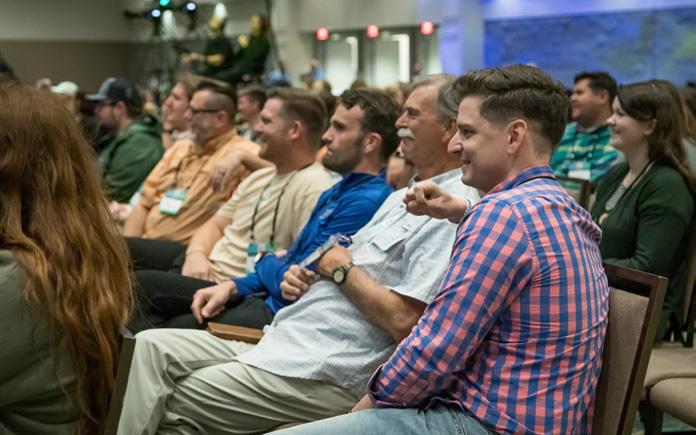
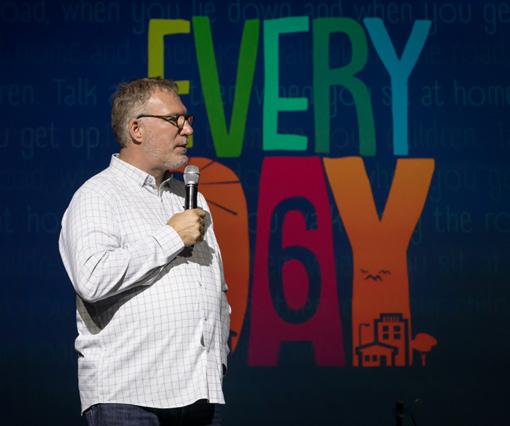
long, everything was up and running, and general session four kicked off. After the first speaker, Arlene Pellicane, Jonnie W., delivered one final comedy routine. The final conference speaker Jim Putman shared a powerful challenge titled “Hope for the Prodigal.” Keith Ferrin shared spoken word poetry from John 21.
Chap Clark (conference emcee), Ron Hunter, and Derek Altom returned to the stage to recap the conference and to share information regarding the 2025 conference before the conference came to an appropriate end: worship.
God continues to use the message of Deuteronomy 6 to impact churches and homes across the globe. One of the most underserved areas for the church in the United States is the Pacific Northwest, especially the Seattle area. We at D6 Family Ministry are thankful the Lord has opened these doors to share the message of generational discipleship in this area. For information about D6 Northwest 2025, visit D6Conference.com.
Visitors to Central Florida in April expect crowds of excited visitors, palm trees, and brilliant tropical sunshine...but bubble wrap? Yes, bubble wrap! Attendees found strips of bubble wrap waiting on their chairs during the first general session, each bubble representing the milestone moments parents must seize EveryDay to weave the fabric of faith in their children’s lives.
The fun sound of bubbles popping echoed across the ballroom throughout the first session, as pastor and marriage coach Brad Rhoads urged attendees to prioritize marriage ministry as a foundational strategy of church ministry.
Next, D6 Family Ministry CEO Ron Hunter challenged churches to adopt creative approaches when ministering to families that do not fit the traditional “Norman Rockwell portrait” of family. We must remember God is the Heavenly Father to every family of any kind and learn to nurture,


encourage, empathize, and counsel those families biblically.
Kurt Bruner, founder of D6HomePoint.com, introduced four key reasons family ministry is getting harder along with strategies to help churches become more strategic about meeting the challenges and developing dedicated Christian disciples.
On the second morning of the conference, Carissa Potter, founder of Via, pointed to families as a key component in fulfilling the Great Commission. She urged parenting with a global vision for the gospel, developing compassion for the nations within their children. “Loving the nations should feel normal to our kids,” she noted. “So, infuse God’s love and purposes for the nations into your everyday, normal family life.”
Speaker and counselor Michelle White used the simple analogy of a juicer to introduce a simple yet powerful acronym. Learning to P.R.A.Y. (Pursue, Rightly, And, Yield) will help learners understand the Bible in its true context, overcome the intimidation of Bible study, and ignite daily passion for God’s Word.
North Carolina pastor Chris Sasser provided simple tips for “traveling light,” to avoid the baggage that often weighs believers down in their journey of faith. He encouraged them to exchange those burdens for true freedom in Christ.
During general session three, four speakers delivered rapidfire, brief messages.
• Tony Souder, CEO of One Hundred Years, urged listeners to provide young people with a powerful sense of belonging in the Body of Christ through carefully fostered intergenerational prayer relationships in the church.
• Youth pastor and author Jon Forrest encouraged those in ministry to become “Super Youth Workers” by simply being faithful to the Lord, their families, and their ministries. They can ease the pressure by remembering they “don’t wear the [superhero] cape. Jesus does!”
• President and CEO of AWANA Matt Markins
confronted the current stalemate between church and home and introduced data to help churches, parents, and leaders get beyond the stalemate, noting, “We must move past the declaration to dialogue.”
• President of the National Center for Life and Liberty, attorney David Gibbs shared suggestions for smart staff selection through intentional, mission-based, emotion-free hiring. “Nobody is better than the wrong somebody,” he reminded the audience.
During the final main stage session, former atheist Jim Putnam shared his own prodigal journey and return to faith, along with his son’s prodigal wandering. Then, more importantly, he shared the story of his son’s return to the faith, accompanied by his own emotional fallout that almost cost his ministry. He urged churches and individuals to be intentional about giving prodigal young people and their parents “a rope to cling to through the storm.”
Final speaker Shane Pruitt, Next Gen director for the North American Mission Board, reassured listeners there is no “secret formula” for reaching the next generation and offered six important reminders:
1. There is no secret, just the Holy Spirit, the Bible, and the gospel.
2. NOW is the time to reach students.
3. Students are the church right now.
4. Young people don’t care how old you are (so just be you).
5. Young people know brokenness all too well.
6. Students are on a truth journey.
“This generation is open to the Bible,” Pruitt concluded. “And we cut through the noise of culture with the Word of God!”
Throughout the conference Michael Boggs, Hanna Kerr, Josh Nichols, and Carolina Tervel, led attendees in worship, setting a reverent tone for each session.
Emcees Marianne Howard and Kevin Jones navigated a packed schedule well, guiding main stage sessions, interviewing speakers, asking probing questions to help listeners
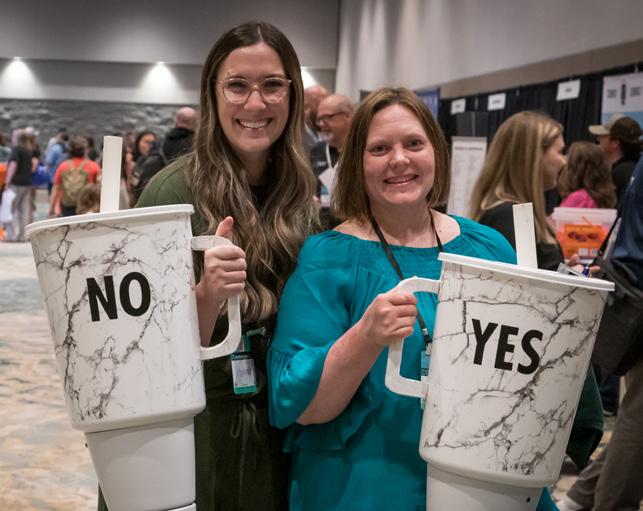
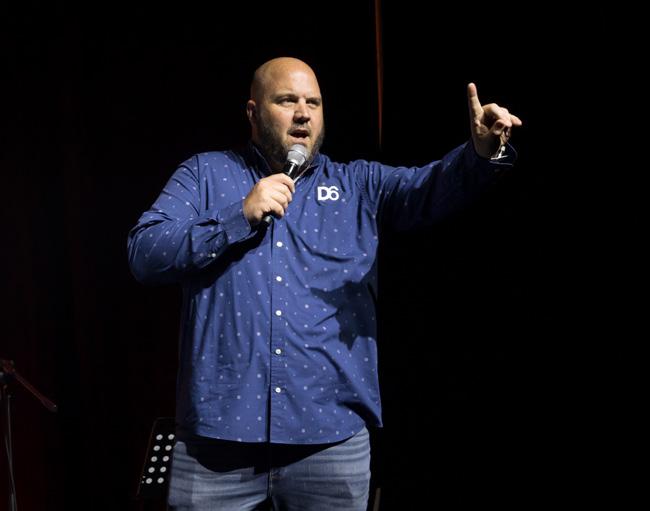
process what they had heard, and prompting audience feedback and interaction.
Jon Forrest brought his high-energy, wacky fun and games back to the conference, opening each general session early with audience participation, crazy questions, goofy prizes, and a non-stop barrage of humor. (And it may be years before some conference-goers can erase the memory of Jon in a super-hero suit during the final session!)
The final session ended with a commissioning prayer as attendees were sent back to homes, churches, and ministries excited, renewed, and refreshed. Ready to seize discipleship moments. Ready to make the most of EveryDay.
Intertwined throughout the main stage schedule, D6 Southeast also included eighty-plus seminars covering a profusion of topics in the areas of family ministry and discipleship. Speakers shared ideas and resources, challenged listeners with new and creative strategies, and provided tools and resources to help churches equip families for discipleship.
Speaking of resources, 43 exhibitors and sponsors filled the Resource Center, which was flooded by attendees between sessions and seminars, filling the space with lively discussions about tools and techniques. These conversations spilled over into hallways and common spaces and into mealtimes as everyone processed the flood of information received.
“What an amazing time we have had,” said Derek Altom, conference director. “We made the most of EveryDay of this conference!”
Altom announced D6 Conference Southeast 2025 will take place April 22-24, 2025, at World Center Marriott in Orlando, Florida. For more information, or to register, visit D6Conference.com.
Coverage Team: D6 Northwest, Derek Altom, director of events and development for D6 Family Ministry; D6 Southeast, Eric Thomsen, managing editor, ONE Magazine ; Photography, Kristi Johnson, Sydney McClure, Lena Wooten, Marianne Howard
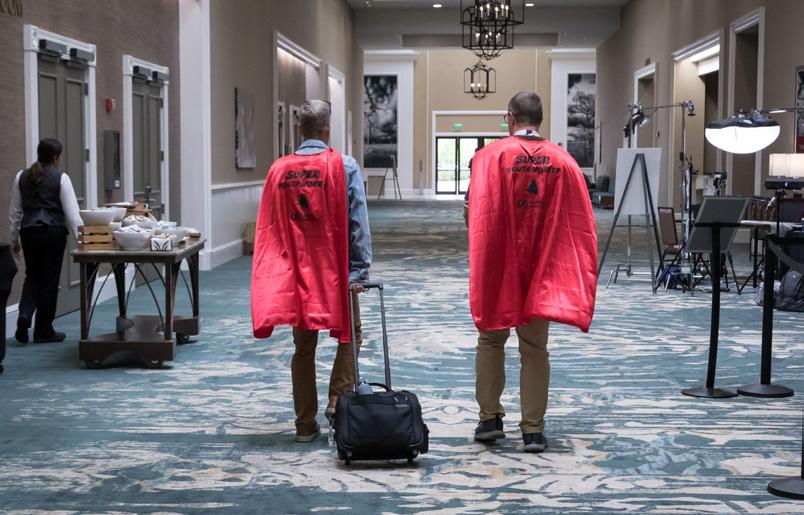




Antioch, TN— Free Will Baptist Foundation received 64 grant applications totaling $5.3 million in 2024. The Foundation was grateful to be able to increase the grant funding available from $250,000 to $500,000. The board prayerfully considered each application and approved the following ministries to receive a grant.
Foundation Director David Brown offered his thoughts. “Thanks to everyone who took the time to apply for a great this year and congratulations to all the ministries that received grants. We anticipate hearing how God worked through the various projects and ministries.”
See the list below for all ministries receiving grants.
WNAC: Shine! Event for Girls ....................................................... $50,000
IM: Spain, Diez 42 Ministry Center for Refugees and Immigrants $50,000
IM: Côte d'Ivoire, 1040! Student Housing $40,000
Hilltop FWB Church: For Southeastern FWB College $40,000
IM: Côte d'Ivoire, Center AR du Nord Regional Office ................................. $35,000
NW Association: Student Internship Program ........................................ $33,000
D6 Family Ministry: 2024 Vertical Three Conference Expenses ........................ $25,000
IM: Bulgaria, New Life Shumen Church Building Renovation ........................... $25,000
NAM: The Bridge Church Fredericksburg, Outreach Initiative ......................... $25,000
NAM: Grace City Church, Purchase Permanent Location $25,000
IM: India, Friends of India, Expand the Hanna Memorial Mission School $20,000
NAM & Welch College: Scholarships for Spanish-Speaking FWB Leaders $20,000
IM: Bulgaria, New Life Svishtov, Secure Land for a New House of Worship .............. $16,000
Historical Commission: Devotional and Biographical Book on Dr. Mary Ruth Wisehart ... $15,000
NAM: Cultivate Church, Building Project for Haitian Ministry & Preschool .............. $15,000
D6 Family Ministry: Discipleship Books .............................................. $12,000
Rejoice FWB Church: Expand Facilities .............................................. $12,000
Indiana Missions Board: Launch "Go All In!" $10,000
IM: Pakistan Vocational Training Institute $10,000
IM: Japan, New Life Church Remodel Project $10,000
Lifegate FWB Church: Expand Homeschool Ministry................................... $5,000
IM: Subsidize Six-Day Perspectives Intensive Conference in 2024 ...................... $5,000
NAM: Equip Church; Partner with Shoe Show, Inc. to Provide "Shoes for Longview" ...... $2,000
To learn more about the Foundation Grant Program, visit fwbgifts.com/about-our-grant-program.

What does it mean to be Doers of the Word? This is the question Free Will Baptists will consider when they gather in Tampa, Florida, July 21-24, for the 88th National Convention. Why is this theme so important? The answer is simple, according to Executive Secretary Eddie Moody. “Now, more than ever, the lost world needs to see the example of Christians who simply do the Word!”
Sunday morning, after Gary Clark (FL) teaches the Sunday School lesson, Dr. Bob Brown (FL) will encourage listeners to do the Word by embracing trials (James 1). Sunday evening, Josue Suarez (FL) will offer the challenge to do the Word by treating others well (James 2). Monday, Chaplain Brad Hanna (VA) will remind the congregation to do the Word by taming the tongue (James 3:1-8). Tuesday, Reuben Cason (NC) will encourage doing the Word by enduring suffering (James 5:7-12). Wednesday, following the commissioning service for new church planters and missionaries, Noah Taylor (TN) will offer the reminder that every believer has a responsibility to do the Word by reaching the world. Sunday afternoon, attendees will gather to observe the washing of the saints’ feet, and the Lord’s Supper will be observed during the Sunday evening service.



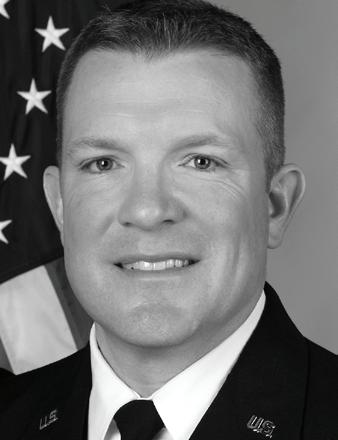


While coming together for worship remains the highlight of each year’s National Convention, the meeting involves far more than services. Delegates will handle the denomination’s business during the annual sessions on Tuesday and Wednesday. Attendees of every age will enjoy 90-plus seminars, panel discussions, and workshops presented by various departments and agencies of the denomination on a myriad of topics. The Exhibit Hall will be packed with great resources from departments, ministries, and vendors. Women will gather for a missionary service, fellowship over coffee, and hear from speakers on various

topics of interest. Students will participate in the Vertical Three Conference, with services, activities, and events designed for them. And CTS Expo national competitive finals will keep parents, coaches, and competitors on the edges of their seats!
Ready to plan your trip to this year’s convention? Find regular updates, schedules, and more at nafwb.org/convention. We’ll see you in Tampa!
Make an IMPACT.
IMPACT Tampa, the annual, one-day service and evangelism campaign, will be held Saturday, July 20. Volunteers will gather at First FWB Church Tampa at 9:00 a.m. Please note: the church will help provide transportation to service locations as needed but will not provide shuttle service to and from downtown hotels.
Two service projects are available this year. The first project is making and distributing hygiene kits for the homeless, working closely with the local Salvation Army for delivery suggestions. Supplies and donations are needed to accomplish this project. That means even if you cannot attend the convention, you can impact Tampa by donating to Master’s Men for the purchase of supplies. Donations can be made online at fwbmastersmen.org/donate or mailed to: Master’s
Men, PO Box 5002, Antioch TN 37011. Please mark these donations IMPACT Tampa. Onsite volunteers can bring supplies with them if preferred. Visit fwbmastersmen.org for a list of needed supplies.
Those participating in the second project will partner with Faith Tampa to serve at local elementary schools in cleaning and beautification projects. More details on project specifics will be forthcoming. Please register your group for either project at www.fwbmastersmen.org/ImpactTampa.
The Convention Choir, Orchestra, and Praise Team will be guided once again by the Convention Worship Team. Worship Service Coordinator Kevin Justice encourages all musicians to visit the following webpages for more details and updates regarding convention music:
fwbworship.com/choir
fwbworship.com/orchestra
fwbworship.com/praiseteam




Despite rising inflation, Tampa offers travelers a great variety of options for low-budget fun. Consider these suggestions:
+ The Tampa Riverwalk is a 2.6-mile-long open space and pedestrian trail along the Hillsborough River with great views, beautiful landscaping, and multiple dining and entertainment options.
+ Sunshine Skyway Bridge, or simply “The Skyway,” is a pair of long beam bridges with a tall cable-stayed bridge that spans Lower Tampa Bay. The bridge provides a wonderful place to see the sunset or watch windsurfers.
+ Historic Ybor City housed the Cuban and Spanish factory workers at the turn of the 20th century. These days, the neighborhood contains shops, restaurants, outdoor markets, and — of course — remains the best place in Tampa to buy Cuban sandwiches.
+ Pirate Water Taxi provides a fleet of six pirate-themed vessels for transportation along the downtown riverway. The covered boats offer daily tours of Tampa, with stops all along the route near attractions, museums, restaurants, and parks. Purchase tickets online or at the home dock at the convention center. Once purchased, you will receive a wristband allowing you to hop on and off the taxi at any stop the entire day.
+ Take it outside. From native wildlife at Lettuce Lake Regional Park to pristine beaches with sugary white sand, the Greater Tampa area has endless opportunities to enjoy nature. Here are just a few:
– Palmetto Beach (7 min)
– Davis Island (7 min)
– Desoto Park (8 min)
– McKay Bay Nature Park (8 min)
– Ben T. Davis Beach (14 min)
– Gardenville Beach (17 min)
– Picnic Island Beach (19 min)
– Gandy Beach Mangroves (20 min)
– Lettuce Lake Regional Park (30 min)
– Hillsborough River State Park (30 min)
– Caladesi Island State Park (accessible by boat only)
+ Savor the flavor. Tampa has many great foods to enjoy (below) that won’t break the bank.





“Demographics is destiny. And when it comes to American Protestant Christianity, the future looks a lot grayer.” This is the opening statement by Dr. Ryan Burge in his blog about Protestant denominations in the United States.1 By looking at the number of “gray hairs and babies,” Burge notes, you can tell a great deal about where a church (or denomination) is headed.
Burge used a data set from the Cooperative Election Study (CES) collected in 2022 from 60,000 Americans over the age of 18. The data set is available on the Harvard University website for anyone to analyze. 2
Survey results indicate Free Will Baptists are among the youngest of American Protestant denominations. For example, from the entire sample of CES respondents, only 23% indicated they were a parent or guardian of a child under the age of 18. In contrast, 28% percent of Free Will Baptists indicated they were a parent or guardian of a child. Only the Church of Christ and Pentecostal Church of God had higher percentages.

1 R. Burge (February 1, 2024). Which denomination are the grayest (the youngest will surprise you). Accessed: https://churchanswers.com/blog/ which-denominations-are-the-grayest-the-youngest-will-surprise-you/ 2 Cooperative Election Study (formerly the Cooperative Congressional Election Study). Accessed: https://cces.gov.harvard.edu
Burge points out a simple pathway to church growth, which is for young couples to have children, and then to retain those children as active church members who take on the roles and responsibilities of older members. In a recent sample of youth who participated in IM and D6 leadership programs, we discovered this is indeed the case among Free Will Baptists.
In her work, Generations, Dr. Jean Twenge notes, “All signs point toward religion continuing to retreat among Americans” 3 with Gen Z being the least churched and religious generation in history. However, in our sample of Gen Z Free Will Baptists who had been active in denominational programs, we found 99% are regular church attenders (85% at a Free Will Baptist church), and 87% are ministering in a church.4
Free Will Baptists have a unique opportunity. We have the youth to meet our discipleship (and future pastor) needs. Let us focus on discipling the young people God has entrusted to us by making church a priority, stretching them in their teen years by promoting our denominational programs for youth, camps, and other activities. Let's challenge them as children and teens to begin ministering in the church. If we do so, the future for Free Will Baptists is bright.
 Eddie Moody Executive Secretary, National Association of Free Will Baptists
Eddie Moody Executive Secretary, National Association of Free Will Baptists
3 J. M. Twenge (2023). Generations: The Real Different Between Gen Z, Millennials, Gen X, Boomers, and Silents—and What They Mean for America. New York: Atria Books, Page 501.
4 E. Moody (2024). Keeping Our College Students, ONE, April – May, 10-14.
If you don't know what to do with old boxes full of associational minutes, church records, magazines, or other historical information, don't just throw them away. The Free Will Baptist Historical Commission will gladly take them off your hands, sort them, and add missing items to our denominational historical collection. To donate, please contact collection curator Phillip Morgan: pmorgan@welch.edu. Let’s work together to preserve the amazing story of our movement for the next generation of Free Will Baptists.
Free Will Baptist Historical Commission
www.FWBHistory.com






WNAC exists to provide opportunities for every woman to fulfill the Great Commission through her God-designed roles at home and abroad. Treasure Bible study guide and associated resources are available online to benefit individuals and local groups. Seminars, workshops, retreats, and events encourage, strengthen, and equip each woman. How can we help you?